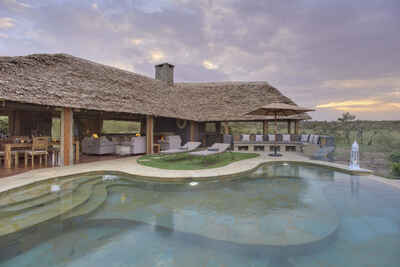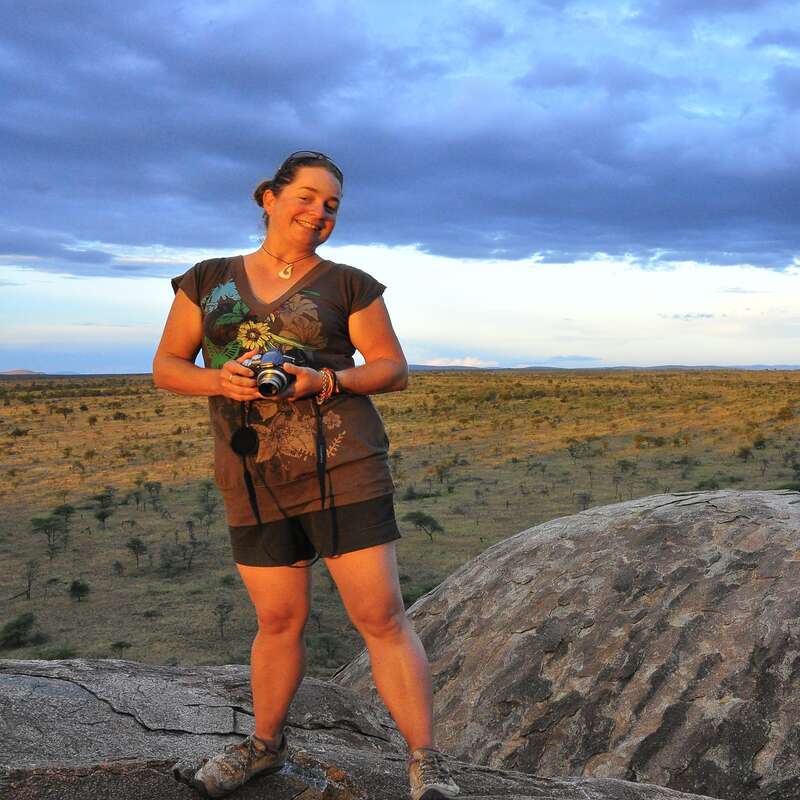About Naboisho Camp
Appealing both to safari purists and those seeking a little luxury, Naboisho Camp is one of the most upmarket ...
... of the handful of small, unfenced camps in the relatively little-visited Mara Naboisho Conservancy, just north of Kenya's Maasai Mara National Reserve. Surrounded by 50,000 acres of untouched savannah and dense thicket, it is located in a game-rich area where guests frequently witness spectacular wildlife events. In 2024, Naboisho Camp underwent a full refurbishment of the rooms and main area. The fresh new look is elegant and spacious; while still maintaining its authentic safari feel.
Naboisho Camp is hard to fault with its highly personable team and seamless service. Food is excellent and the comfort and sense of space extend throughout the camp. While the generously spread tents are capacious and smart, they have retained a feel of the bush with their open-air safari showers and canvas walls. The guiding is superb, and the wildlife experience first-rate. Most of all, while the camp is a substantial and permanent set-up, its impact on the local environment feels relatively low and guests can expect exciting wildlife action on their doorstep.
Our view
Naboisho Camp is hard to fault with its highly personable team and seamless service. Food is excellent and the comfort and sense of space extend throughout the camp. While the generously spread tents are capacious and smart, they have retained a feel of the bush with their open-air safari showers and canvas walls. The guiding is superb, and the wildlife experience first-rate. Most of all, while the camp is a substantial and permanent set-up, its impact on the local environment feels relatively low and guests can expect exciting wildlife action on their doorstep.
Accommodation
7 standard, 2 family
Children
Best for 8+
Open
Closed in April (fluid around rennovatio
Activities

4WD Safari

Birdwatching

Cultural excursion

Fly-camping

Guided walking safari

Hot air ballooning

Night drive

Private activities
Traveller reviews of Naboisho Camp
52 real, un-edited reviews from Expert Africa's travellers.
Arrived 6 Mar 2025, 3 nights
"Naboisho Camp"
Overall rating: Excellent
Arrived 28 Dec 2024, 3 nights
"Naboisho Camp review"
Overall rating: Excellent
Arrived 3 Nov 2024, 3 nights
"Naboisho Camp review"
Overall rating: Excellent
Arrived 13 Jul 2024, 4 nights
"Naboisho Camp Does it All!!!"
Overall rating: Excellent
Arrived 2 Feb 2024, 5 nights
"Naboisho Camp review"
Overall rating: Excellent
Arrived 1 Feb 2024, 3 nights
"Naboisho Camp review"
Overall rating: Excellent
Arrived 19 Sep 2023, 4 nights
"Naboisho Camp review"
Overall rating: Excellent
Arrived 21 Jul 2023, 3 nights
"Naboisho Camp review"
Overall rating: Excellent
Arrived 31 Jan 2023, 4 nights
"Naboisho Camp review"
Overall rating: Excellent
Arrived 30 Jan 2023, 4 nights
"Naboisho Camp review"
Overall rating: Excellent
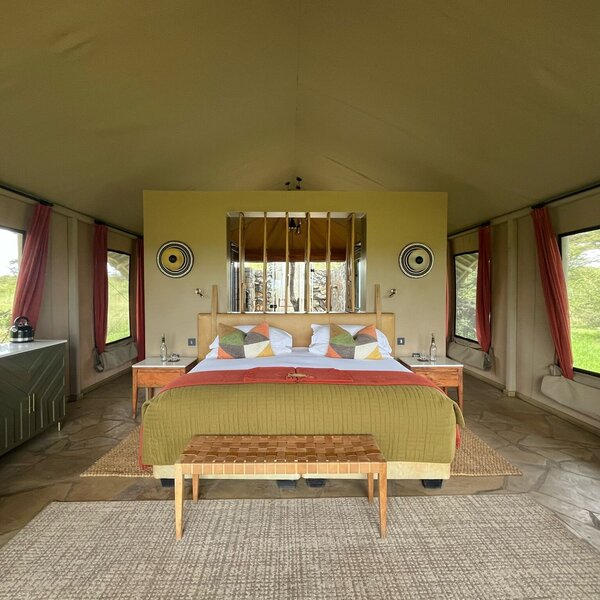
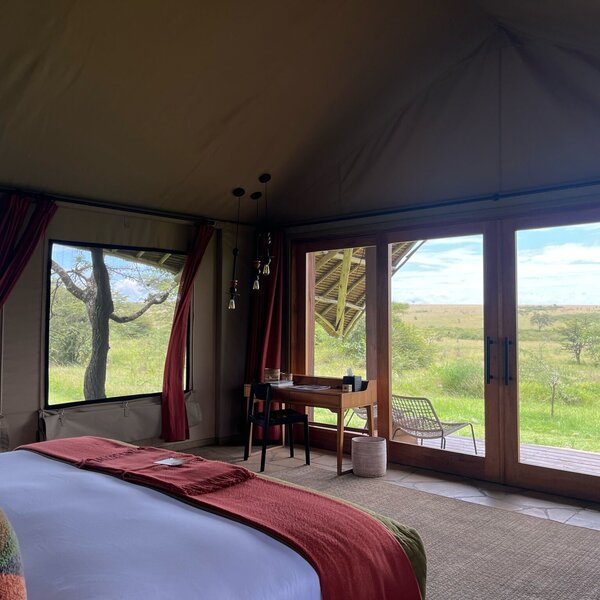
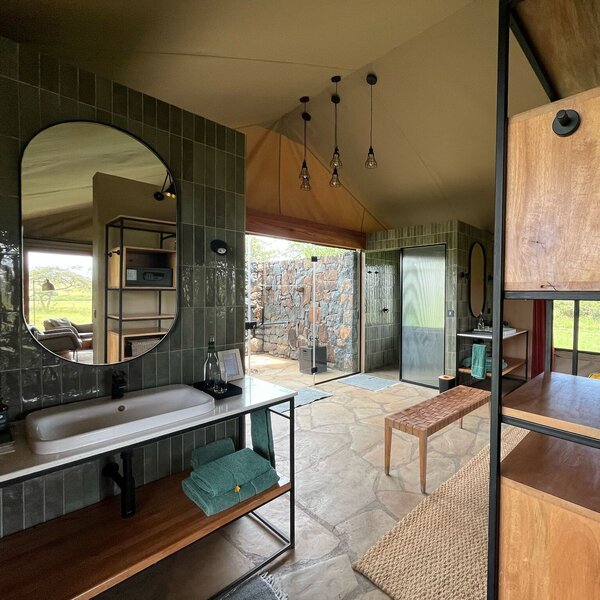
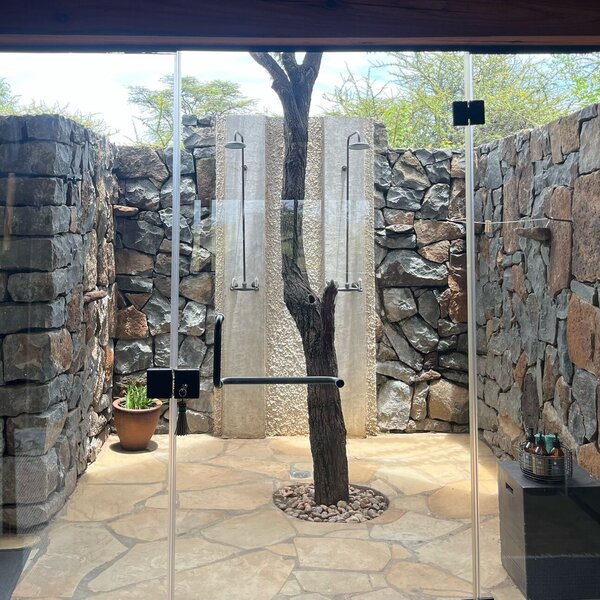
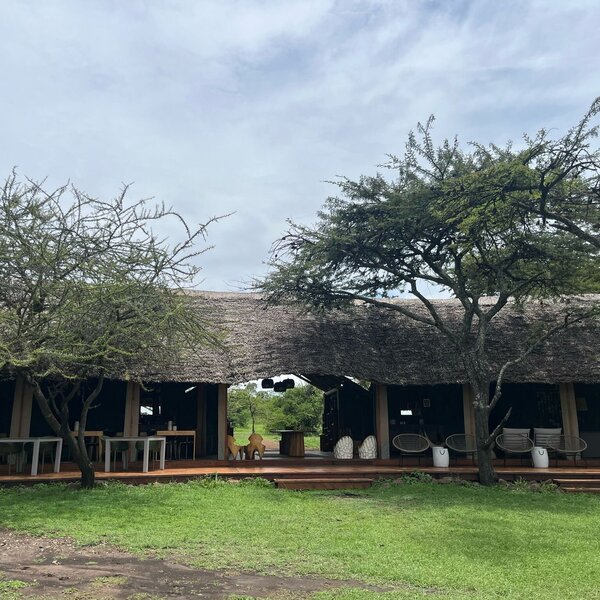
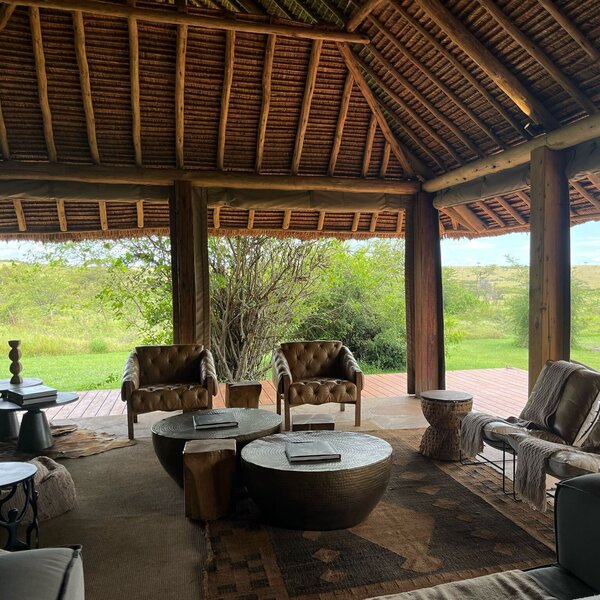
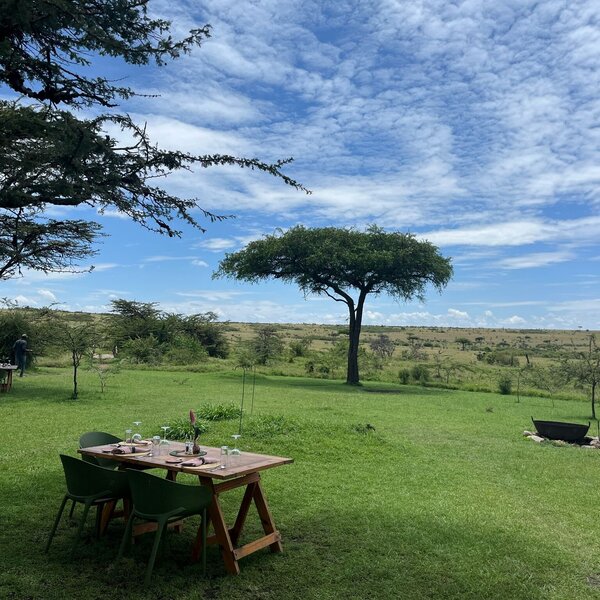
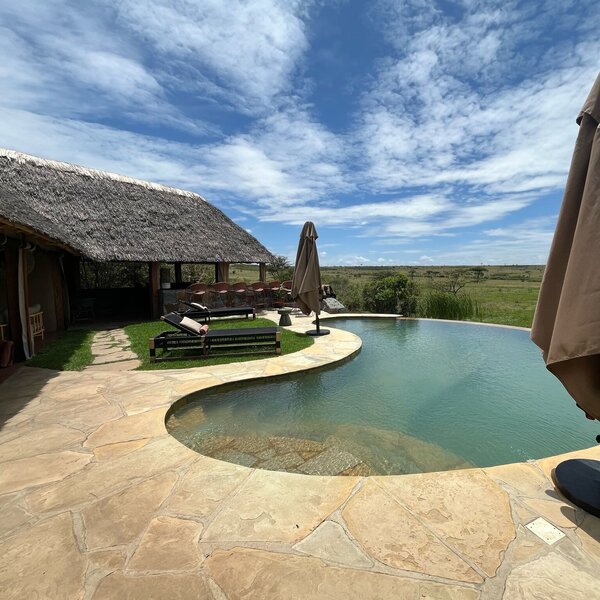
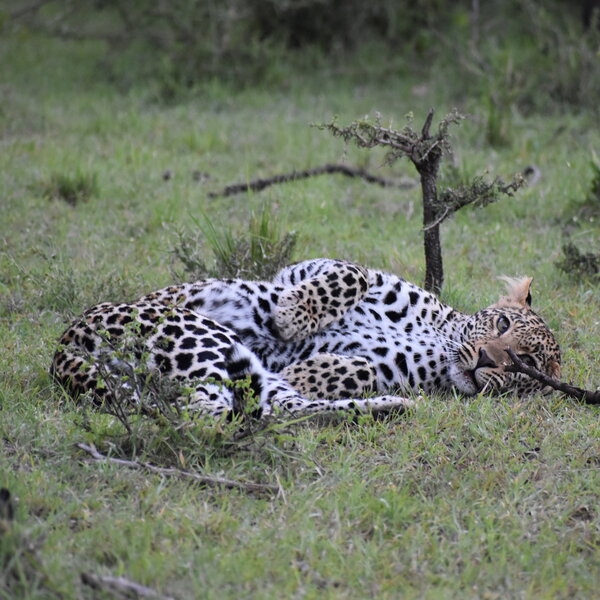
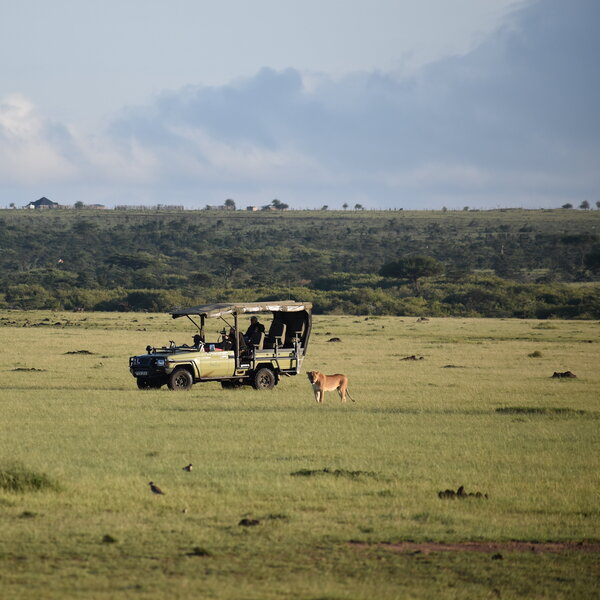
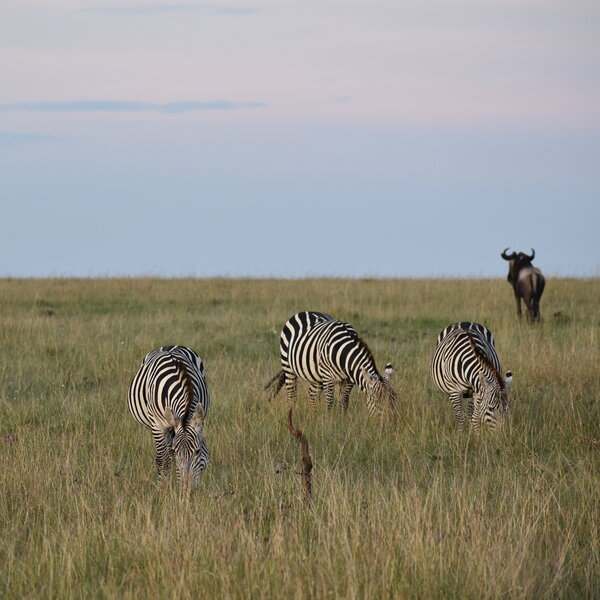
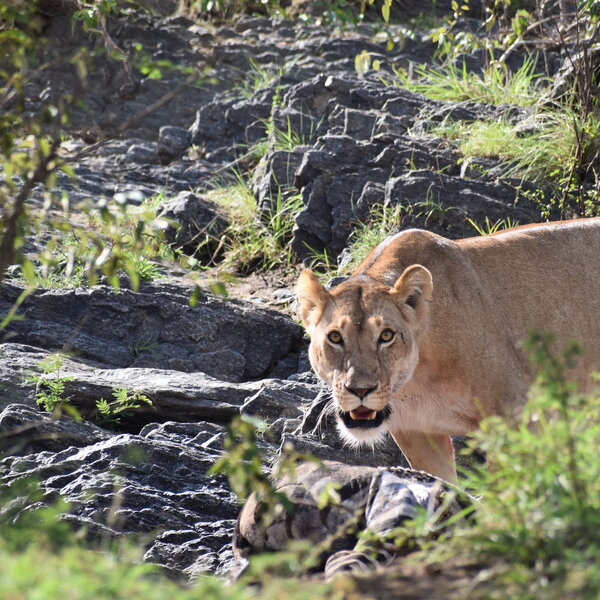
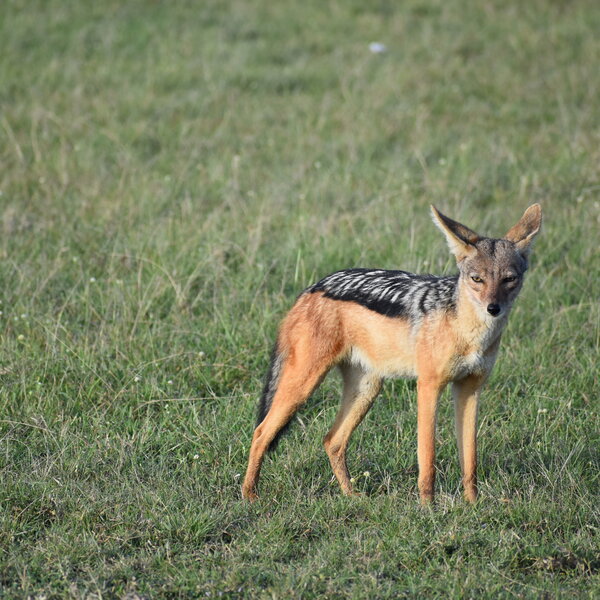
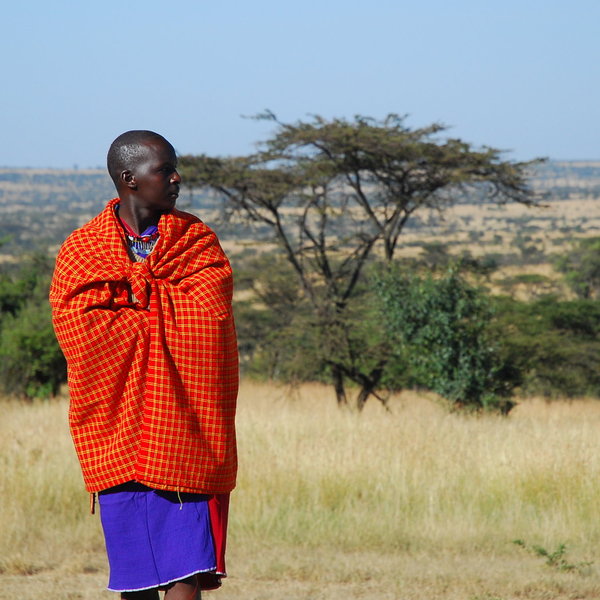
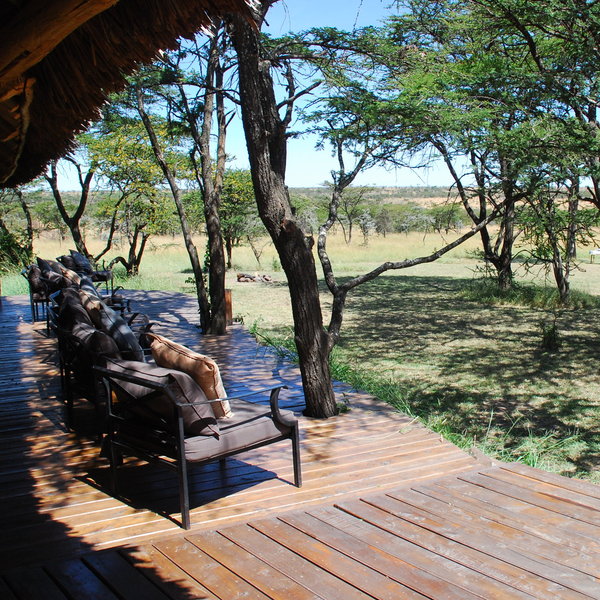
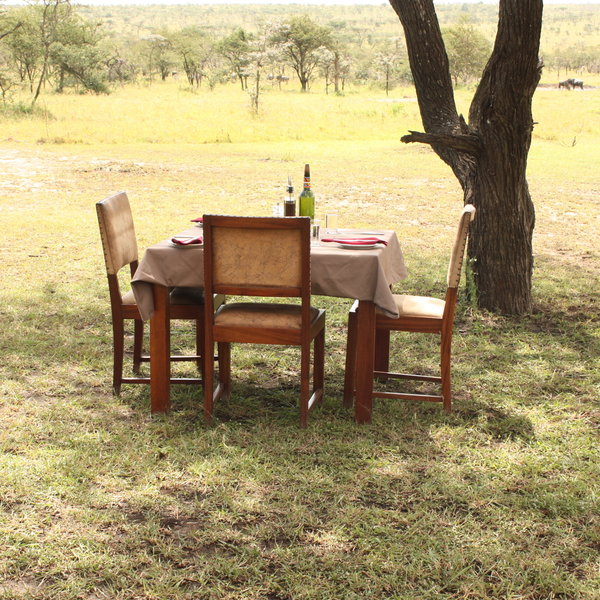
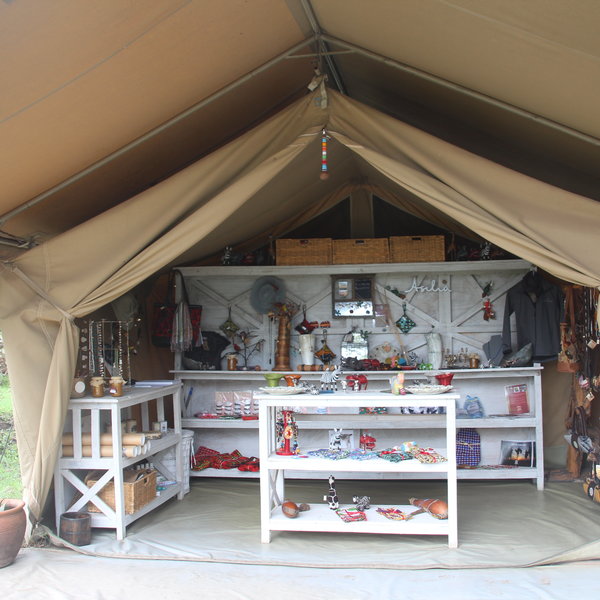
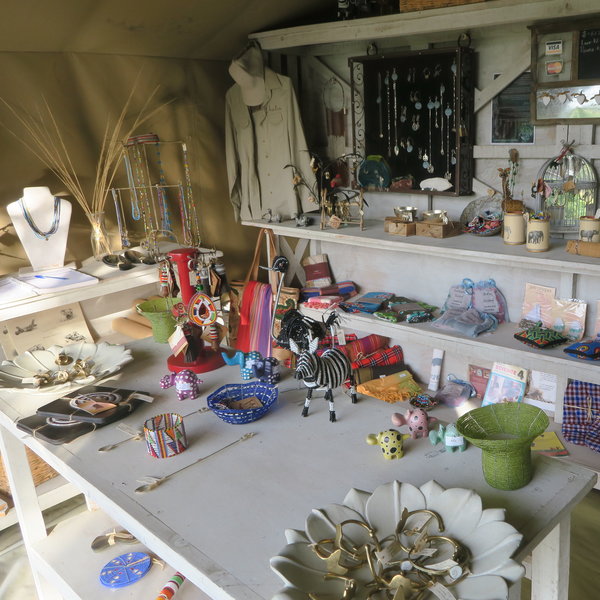
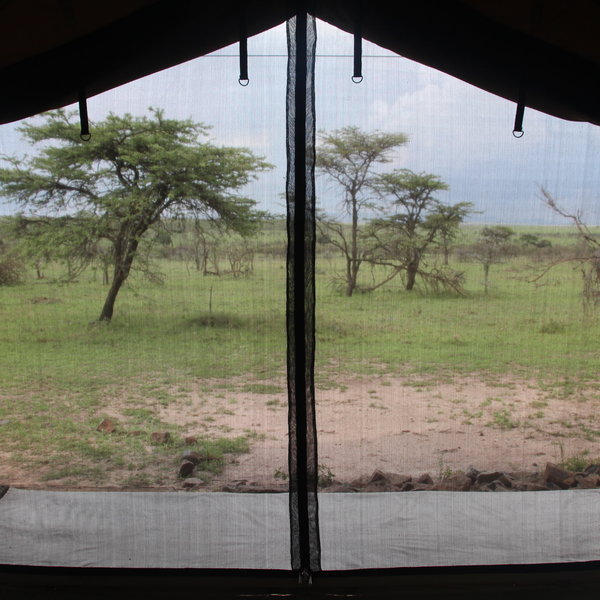
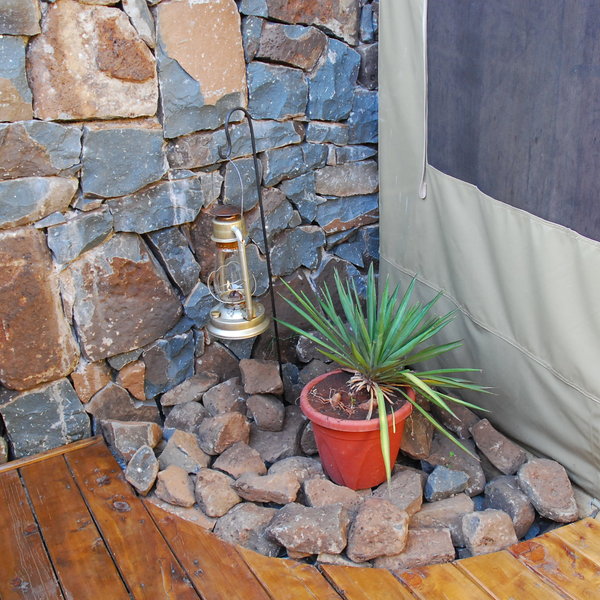
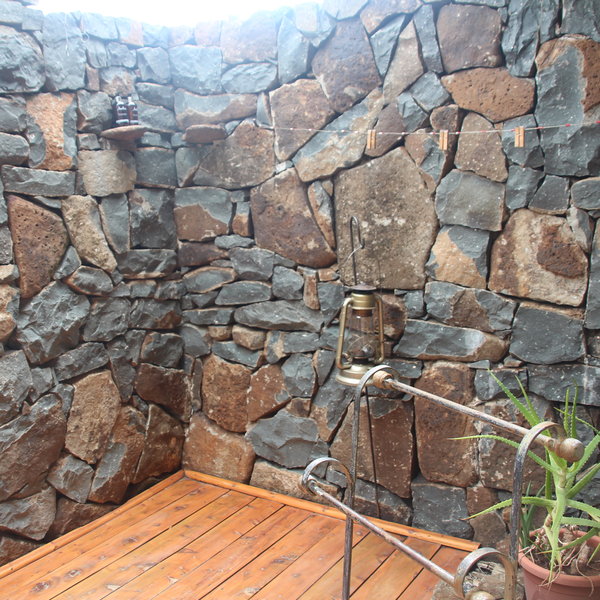
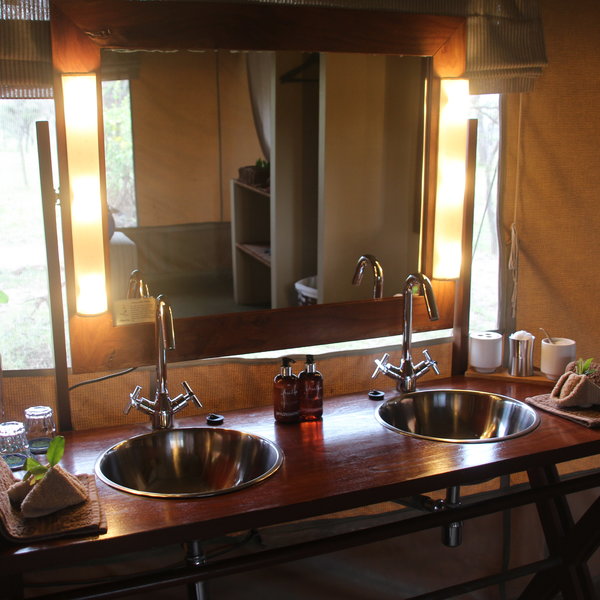
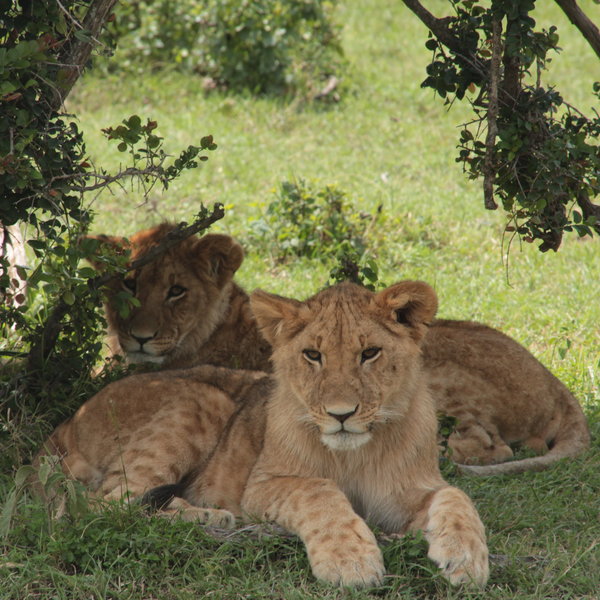
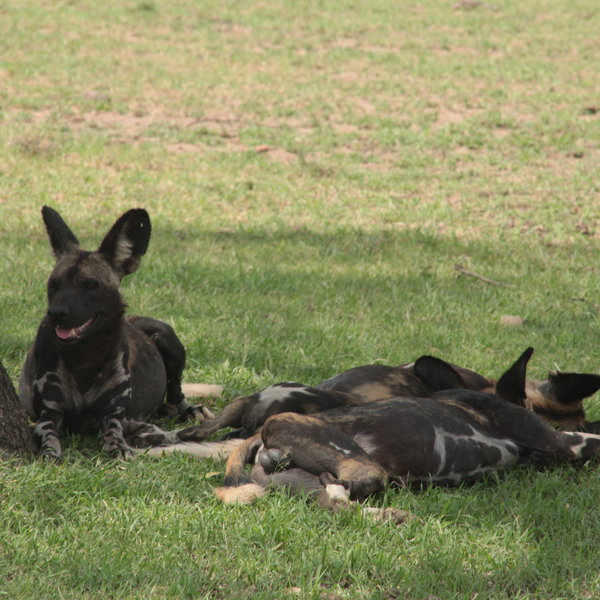
Expert Africa's gallery
When we travel we take lots of photos ourselves to give you a real and un-edited view of the safaris. See our 51 pictures and 1 videos of Naboisho Camp to get the candid view.
View gallerySafaris visiting Naboisho Camp
Just ideas, we'll always tailor-make a trip for you
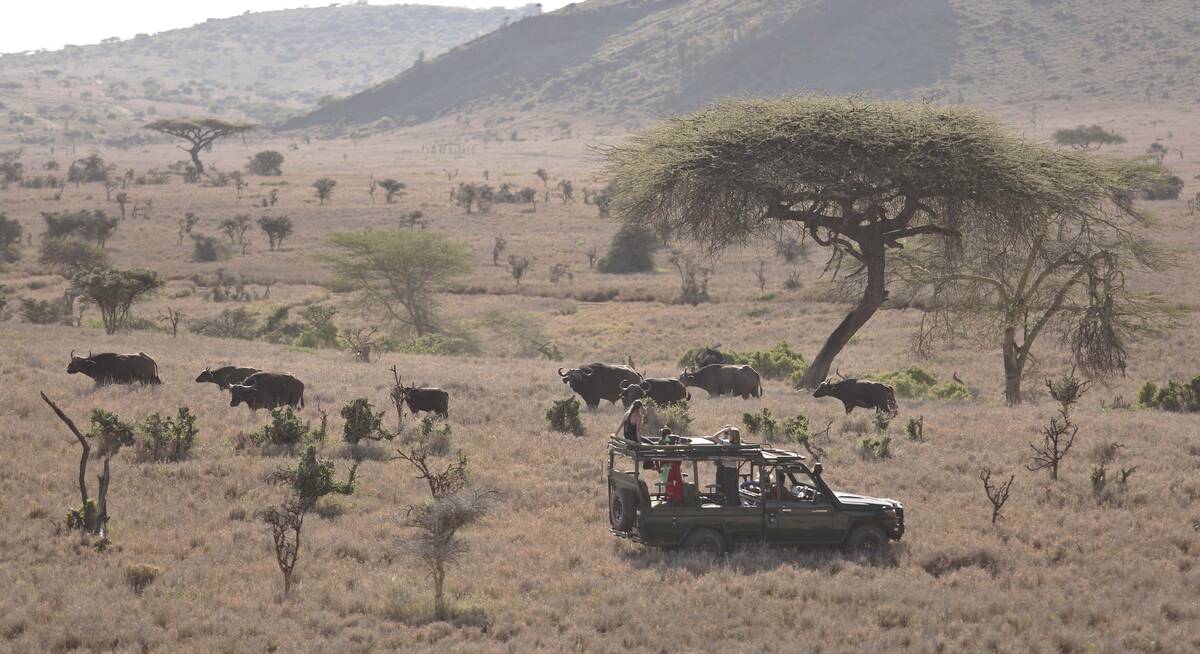
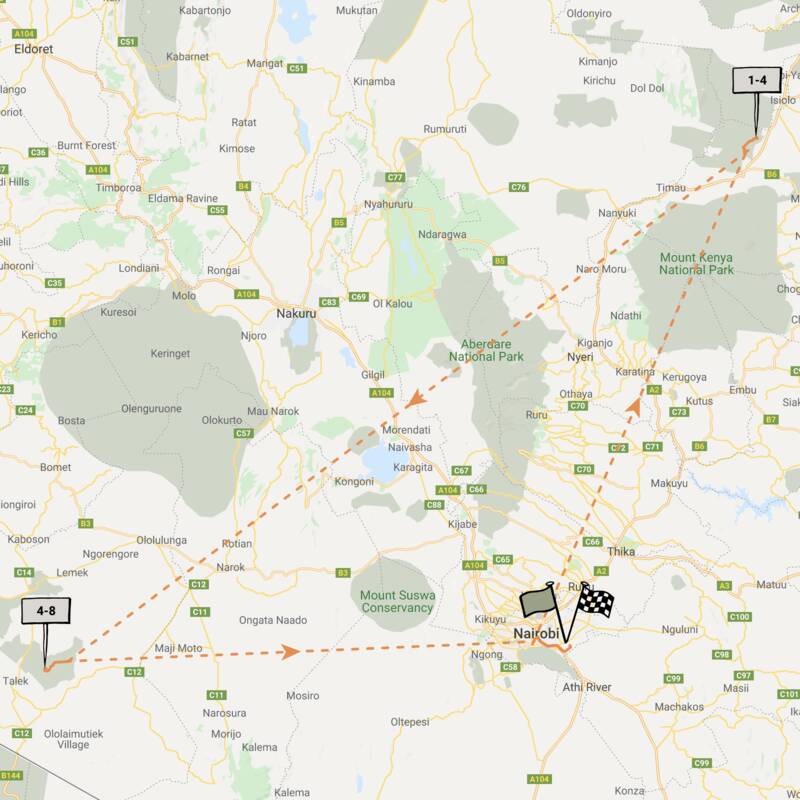
African Hawk-Eagle Fly-in Safari
7 days • 2 locations • 1 country
NAIROBI AIRPORT TO NAIROBI AIRPORT
Two luxurious camps provide relatively quiet game-viewing within Laikipia and the Mara ecosystem. Situated on private conservancies, both Lewa Wilderness and Naboisho offer the chance to sight all of the "Big 5" and to enjoy a range of safari activities.
Visiting Laikipia, Mara Conservancies
US$9,360 - US$16,430 per person
Naboisho Camp: Our full report
Appealing both to safari purists and those seeking a little luxury, Naboisho Camp is one of the most upmarket ...
... of the handful of small, unfenced camps in the relatively little-visited Mara Naboisho Conservancy, just north of Kenya's Maasai Mara National Reserve. Surrounded by 50,000 acres of untouched savannah and dense thicket, it is located in a game-rich area where guests frequently witness spectacular wildlife events. In 2024, Naboisho Camp underwent a full refurbishment of the rooms and main area. The fresh new look is elegant and spacious; while still maintaining its authentic safari feel.
Naboisho Camp is the sister camp of nearby Encounter Mara, also located in the Naboisho Conservancy, and Rekero inside the national reserve, and it shares their focus on top-quality guiding. Guests booked into one camp often spend a night or two in the other, as the conservancy and the reserve complement each other very well.
The camp is a wonderful combination of raw bush and luxurious home comforts. The main area is built of stone and wood and is a more permanent structure than most of its neighbours. The lounge has a selection of comfortable sofas and armchairs and a large stone fireplace, while the dining area is dominated by a long communal dining table. Canvas flaps can be rolled down in bad weather making it warm and cosy inside. In addition to the new look, Naboisho has a small shop, stocked with locally produced items from the various community projects the camp supports. As with its sister-camps, the gift shop is run on an honesty box basis to allow for commitment-free browsing.
Outside is a long wooden deck with comfy chairs, and the grass in front of this area is kept short, often frequented by grass mice and beautiful birds, giving guests a safe garden area for outdoor meals. On our last visit, we arrived in time for lunch and enjoyed a delicious spread of fresh salads, fish, and meats out on the lawn, with elephants wandering past in the middle-distance.
A swimming pool was added in 2019 – rather a rare luxury in the Maasai Mara – and, here, there is a second smaller dining area offering guests more space to spread out and relax, as well as a private dining location for those looking for a higher level of privacy.
There are seven identical spacious tents and two very large family tents. With solid concrete plinths under the tents, stone walling in the open-air bathrooms, extensive decking, wooden pillars, and makuti roof tiles, Naboisho Camp has something of the feeling of a contemporary country house, a mood accentuated by the stylish furnishings, including a pair of softly cushioned wicker chairs and a daybed in the vestibule at the front of each tent. For a quick pick me up, each room has a tea and coffee station, with an assortment of snacks in a cupboard. Solar power in the tents allows charging of batteries and devices at any time.
The en-suite bathroom includes an indoor and twin outdoor shower, double basins, and flush toilet, as well as a spacious storage area for clothes and luggage. You will be left wanting for nothing given the rooms' complementary bathrobes and slippers, wellies, umbrellas, yoga mats, and wash bags.
Once you're inside any of the tents you are in very stylish and comfortable surroundings, but between them, you are essentially in the middle of the savanna, and after dark you'll be escorted every step of the way by the camp staff.
On the northern side of the camp, two family suites are ideal for families or groups, with close access to the pool and bar area. The family suites have two bedrooms with ensuite bathrooms. Indoor and outdoor showers with two basins and flush loos. The bedrooms are separated by a communal lounge, with comfortable sofas, a wine cooler stocked on request, a coffee and tea station, and an assortment of books and board games. Each room in the family suite leads out onto a wooden deck, with east-facing views.
Although physically Naboisho is an impressive camp, its raison d'être, like that of nearly all the Mara's camps is the game viewing, to which its location and environment are supremely conducive. On a recent visit to Naboisho conservancy, we enjoyed sightings of large lion prides daily (there are thought to be five resident prides, each at least 20 lions strong, with more migratory prides and coalitions moving through the conservancy) as well as a fascinating leopard interaction between two females competing for territory. Cheetahs are still present, although the large numbers of lions and spotted hyenas make them more elusive. Most of the vegetation in the immediate vicinity of the camp has been left as wild as possible: after the rains, tall grass grows close to the tents and natural thorn-bush scrub provides both shade and a habitat for birds (the very rare Karamoja apalis has been spotted) and countless small – and sometimes larger – animals. On our recent visit, we went to sleep to the sound of lions roaring nearby and enjoyed watching giraffes eat the vegetation around the tents.
An expert local and silver-certified Maasai guide accompanies every drive or walk from Naboisho Camp and we have continually been impressed by the quality of the guiding here. Game walks are a stand-out feature and the game encounters close to camp can be vivid and impressive. To the south and west of the camp, there are some stunning walking areas, including wide open, short-grass plains and some deeply carved canyons and viewpoints. There is the option to do some really long walks, which enable you to access certain areas where vehicles cannot go, and there is always the possibility of approaching big game on foot. On a previous game walk with an armed Masaai guide, we spotted lion, buffalo, topi, zebra, and giraffe, and also learned a lot about the indigenous plants and trees in the area.
Naboisho also offers fly-camping which works particularly well in combination with walking safaris. Walking out from camp accompanied by an experienced guide you will head to a scenic location where a small fly-camp has been set up. Here you can enjoy dinner under the stars before spending the night sleeping in small tents in the middle of the African bush. After a sumptuous bush breakfast, you will slowly make your way back to Naboisho. It is essential to pre-book this activity in advance of travel.
Another option is to visit a local village, a non-commercial experience with no selling or pressured interactions. The cost, an additional US$30, is payable to the camp, who hand it to the community liaison officer for fair distribution.
Naboisho supports a number of projects including the Maa Trust, which involves local communities in occupations as diverse as honey collection and bead making; they also support the Kenya Wildlife Trust, which runs various conservation projects. Please ask us for more information on either of these.
Activities
4WD Safari
Birdwatching
Cultural excursion
Fly-camping
Guided walking safari
Hot air ballooning
Night drive
Private activities
Families & children
- Attitude towards children
- Naboisho is happy to take children of five and above.
- Property’s age restrictions
- Minimum age 5 (12 for walking safaris).
- Special activities & services
- Short walks on the open plains, where there is very good visibility, can be done with younger children. Babysitters are available, but only from housekeeping: there are no trained childcare specialists.
- Equipment
- The camp has two superb family tents and kid's colouring kits but no other specialist equipment.
- Generally recommended for children
- With two family tents and a range of child-friendly activities, we would recommend Naboisho for children aged from about eight years.
- Notes
- The camp is in a wild area, with dangerous wildlife, so parental supervision is essential at all times.
Food & drink
- Usual board basis
- Full Board & Activities
- Food quality
- The food at Naboisho Camp is some of the best in the Mara. On each of our stays, we could have done with even more activities to work off each delicious meal – where everything was homemade, of course.
Dining is as a group, by default, but guests are welcome to request private dining or individual tables for special occasions, and the camp managers will often prepare individual tables when there are distinct groups in camp.
Breakfast is often a picnic in the bush: fruit salad, breakfast pastry, and muffins, with tea and coffee from the thermos. Alternatively, there may be early tea or coffee, with biscuits or muffins, then guests come back to camp for brunch.
Mid-morning brunch, served on the lawn in front of the lounge deck, is a very welcome meal after an early-morning drive or walk. We enjoyed a bacon and tomato tart, homemade chocolate muffins, fruit salad, cereals, and yoghurt. We didn't have room for more than a sampler of the cooked breakfast sizzling on the barbecue.
Lunch is served around 1pm and is typically a buffet of fresh salads. On our recent visit, we tucked into a selection of fish cakes, crispy spinach, and serval salads; this was finished by a sweet cranberry ball.
Naboisho Camp is a reminder of how much travel can broaden the waistline as well as the mind. By shortly after 4.00pm, the staff were setting up for afternoon tea, accompanied by shortbread and chocolate brownies.
Dinner is always three courses with a choice for each, and is usually served communally. Typical first courses are homemade soup, avocado mousse, mushroom pancake with white sauce or a herby salad. Main courses might be battered fish with citrus sauce, rice and steamed vegetables, or an unusual couscous with pork steak and Moroccan spices. Naboisho also hosts 'African night' themed dining once a week, which during our last visit included a delicious range of barbecued and grilled meats, creamed spinach and other steamed vegetables. They do great puds here too: the thick chocolate mousse was heavenly. - Dining style
- Mixture of group dining and individual tables
- Dining locations
- Indoor and Outdoor Dining
- Further dining info, including room service
- Naboisho will do room service. Dining is as a group, by default, but guests are welcome to request private dining or individual tables for special occasions and the camp manager might allocate individual dining if they recognise groups' would prefer to enjoy their own company.
- Drinks included
- All available drinks are currently included except for some imported cellar wines, champagnes and specially spirits, which will cost extra.
Filtered drinking water is provided in the tents.
Our travellers’ wildlife sightings from Naboisho Camp
Since mid-2018, many of our travellers who stayed at Naboisho Camp have kindly recorded their wildlife sightings and shared them with us. The results are below. Click an animal to see more, and here to see more on our methodology.

100% success

100% success

100% success

100% success

100% success

100% success

95% success

95% success

95% success

85% success

80% success

12% success

6% success

0% success

0% success

0% success
Getting there
- Location
- Maasai Mara Conservancies, Kenya
- Ideal length of stay
- Three nights minimum, allowing two full days to explore Naboisho Conservancy. With four or five nights at the camp, however, you could take a full-day game drive to the Maasai Mara National Reserve (which will incur an additional cost in low season).
- Directions
- The nearest airstrip is Ol Seki, a 40-minute drive from camp. For an extra charge, guests can also fly from Ol Kiombo in the neighbouring Olare-Motorogi Conservancy.
- Accessible by
- Fly-and-Transfer
Special interests
- Photography safaris
- Naboisho’s photographic vehicle boasts rotating chairs and drop sides, and top-quality guides position it to get the perfect shot. The camp’s location in a game-rich, private area offers access to wonderful landscapes and wildlife without the crowds.
- See ideas for Photography safaris in Kenya
- Walking safaris
- Walking safaris conducted by Maasai guides at this camp are accompanied by a gun holder with a large-calibre gun, enabling you to enter areas where dangerous wildlife may be encountered. Expect to meet lions, buffalos and elephants.
- See ideas for Walking safaris in Kenya
- Scenic walking & hiking
- Led by an expert local Maasai guide, the walks at Naboisho offer some fantastic opportunities for walking in Kenya. Here you can explore a part of the Mara Conservancies on foot, learning about the landscape on the way.
- See ideas for Scenic walking & hiking in Kenya
- Luxury safaris
- The main areas feel like a country house, with wooden pillars, a stone fireplace and swimming pool. Attentive service adds further to the feel of comfort, while top-quality guiding, numerous dining spots and excellent food add the finishing touches.
- See ideas for Luxury safaris in Kenya
Sustainability
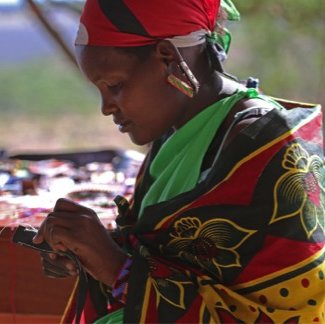
Encouraging local entrepreneurship per education
Within 210km² private Mara Naboisho Conservancy sits Naboisho Camp, hosting only nine tented suites to provide an authentic wilderness experience. As the primary goal of Naboisho, which means ‘coming together’, is to create a balance between protecting wildlife and improving the lives of people, the lodge is especially committed to enhance opportunities for the local communities.
Working closely with Maa Trust, the lodge works to transfer the benefits of tourism in the region to the local community, in exchange for their support and acceptance. For every night tourists spend at Naboisho, $5 is donated to the Maa Trust. Through the teaching and guidance that the trust was able to provide, local people have been able to build their own businesses.
One example of a successful initiative is the Maa Beadwork. Whilst Maasai women are usually married off for cattle, the Maa Trust have taught them beadwork and helped them to earn money and become independent by selling their wares. Over 400 Maasai women are involved in the beading project, making everything from colourful beaded jewellery to home accessories such as candle holders. To further support the programme, Naboisho Camp has an on-site gift shop selling hand-made items purchased from the Maa Trust.
Moreover, for a $25 fee, the camp offers cultural visits to local Maasai villages. $15 goes directly to the community they visit, whereas $5 is donated to the community bursary fund. In the year 2015-2016 alone over $8000 was obtained from community visits.
See more great sustainability projects in Kenya
Communications
- Power supply notes
- There is lighting and power in the tents 24 hours a day.
- Communications
- Wi-Fi is available throughout the camp, in both the rooms and the communal areas. Cellphone coverage in this part of Mara Naboisho Conservancy tends to be poor, but on our recent visit our eSIM with provider, Airlo, worked consistently throughout our game drives.
- TV & radio
- No
- Water supply
- Borehole
Health & safety
- Malarial protection recommended
- Yes
- Medical care
- There are several first aiders on site, who do refresher courses every year. There's a first-aid kit in every vehicle and one in the main camp. The camp has links to the flying doctor service and they also have an emergency drill in place.
The nearest doctor is in Talek, a 45-minute drive away. - Dangerous animals
- High Risk
- Security measures
- There are askaris for escort and security duties. Radios and air horns are found in all tents. There is a safe in the manager’s office and in all guest tents.
- Fire safety
- A fire safety procedure is in place with an assembly point. There are fire extinguishers in every tent, and in the main areas. There is also a fire break around the camp.
Useful info
- Disabled access
- On Request
- Laundry facilities
- Laundry, hand washed and line dried, is included in the rate. No female underwear can be taken, but soap powder is provided in the bathrooms for you to handwash these items.
- Money
- No foreign exchange service is offered. Valuables can be kept in the safes found in each guest tent, or locked in the safe in the main office.
- Accepted payment on location
- Cash payments may be made in US dollars, euros, pounds sterling or Kenyan shillings. Visa and Mastercard are acceptable, with a 5% surcharge.
Plan and book your trip with Expert Africa
All of our trips are tailor-made, so we'll always adapt them to suit you. Talk to an Expert and let us plan and arrange your perfect trip.

Talk to an Expert
Call or email us now! We’ll match you with the Specialist in our team who is best suited to help you. Then together we can start planning your trip.

Set up your itinerary
Based on our experience and your ideas, your specialist will create a detailed, costed itinerary. We’ll refine it together, until we have a trip that you’re perfectly happy with.

Prepare for your trip
The same Specialist will make the seamless arrangements for your trip, send you detailed travel documents, and be available to answer any questions before you depart.

Travel with peace of mind
After you set off, you’ll be cared for by our partners in Africa, most of whom have worked with Expert Africa for decades. And if you ever need us urgently, we’re available 24/7.

When you return
We love to learn about your trip, and so will always be grateful if you’ve the time to give feedback to your Specialist when you return.
Naboisho Camp's location
Look closer at the environment and surroundings of Naboisho Camp.
Excursions from Naboisho Camp
Optional extra day-trips and excursions possible whilst you're staying at Naboisho Camp. Talk to us: these are usually best arranged before you go.
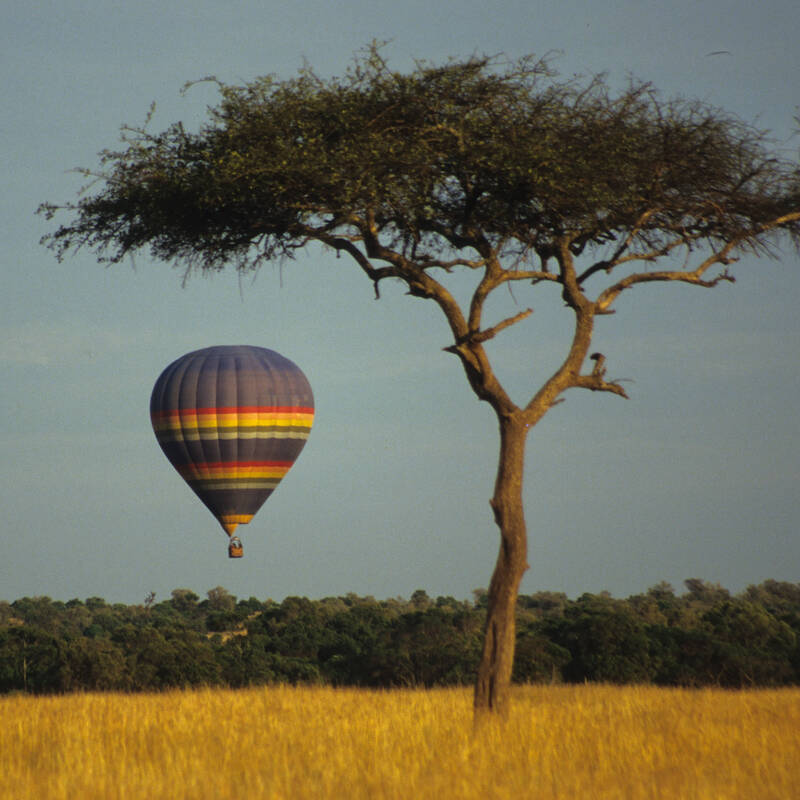
Balloon flight over the Mara
3 hours in total - morning only
With the sun rising over the Loita Hills, you scramble into the balloon basket for the start of a once-in-a-lifetime experience. You’re about to go drifting with the breeze above the trees and plains of one of the world’s greatest wildlife regions.
More about Balloon Safari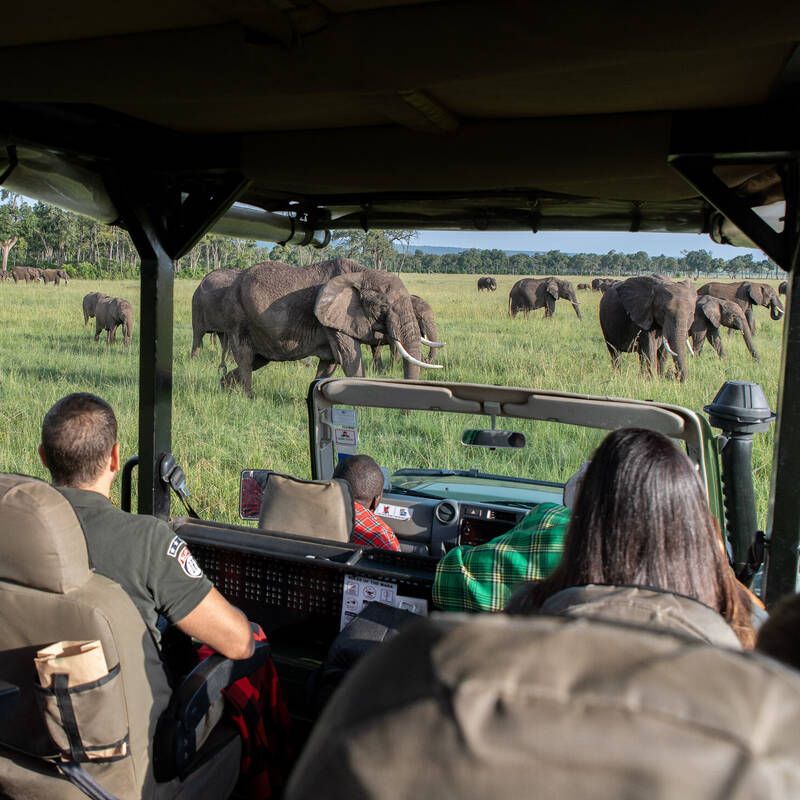
Safari in Maasai Mara National Reserve
All day from sunrise to sunset
If you're not staying in the Maasai Mara National Reserve itself, you're likely to be staying in one of the outstandingly wildlife-rich Maasai-owned private conservancies just outside the reserve boundary. A full-day game drive in the reserve gives you the chance to visit the Mara River and see some of the reserve's fabled wildlife locations.
More about Maasai Mara SafariOther lodges in Maasai Mara Conservancies
Alternative places to stay in this same area.
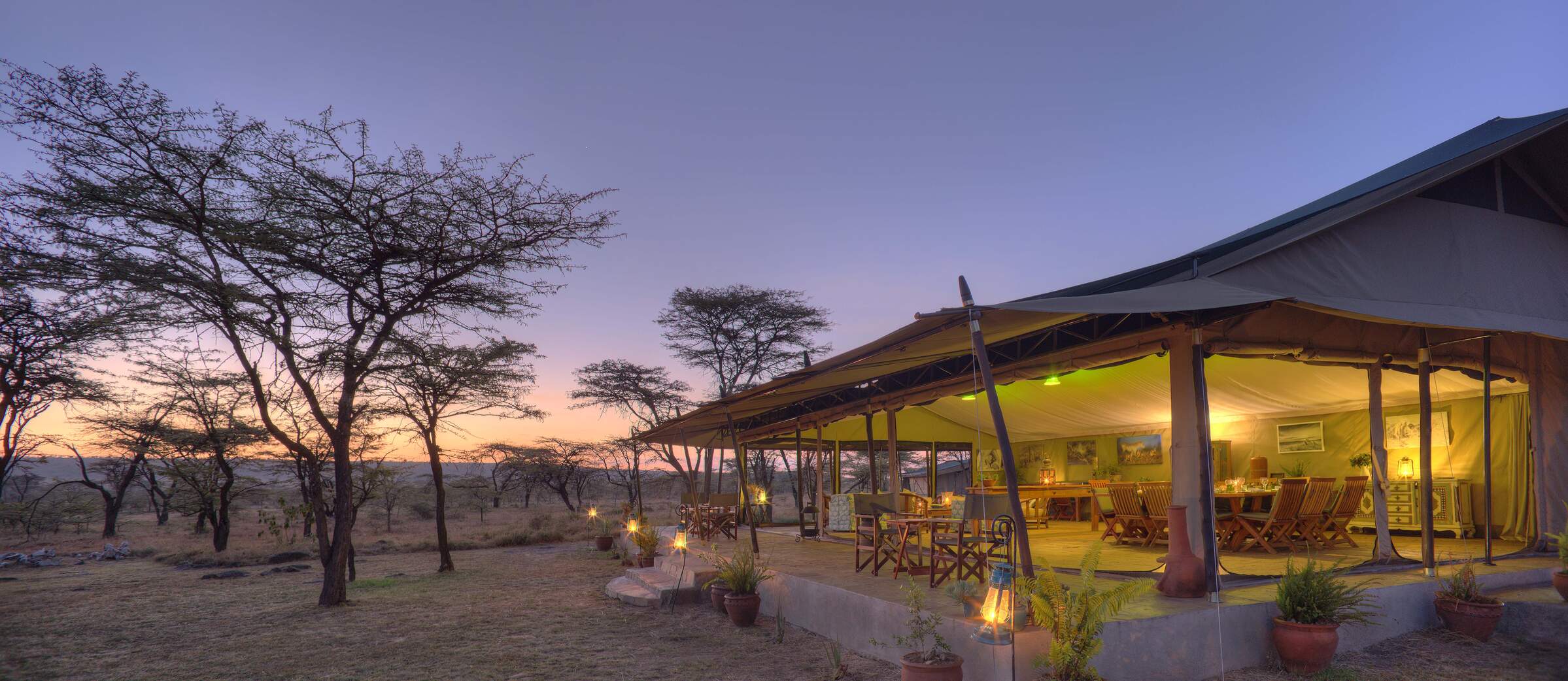
Kicheche Bush Camp
Kicheche Bush Camp is an excellent, intimate and authentic tented camp with a relaxed atmosphere and a focus on photography safaris.
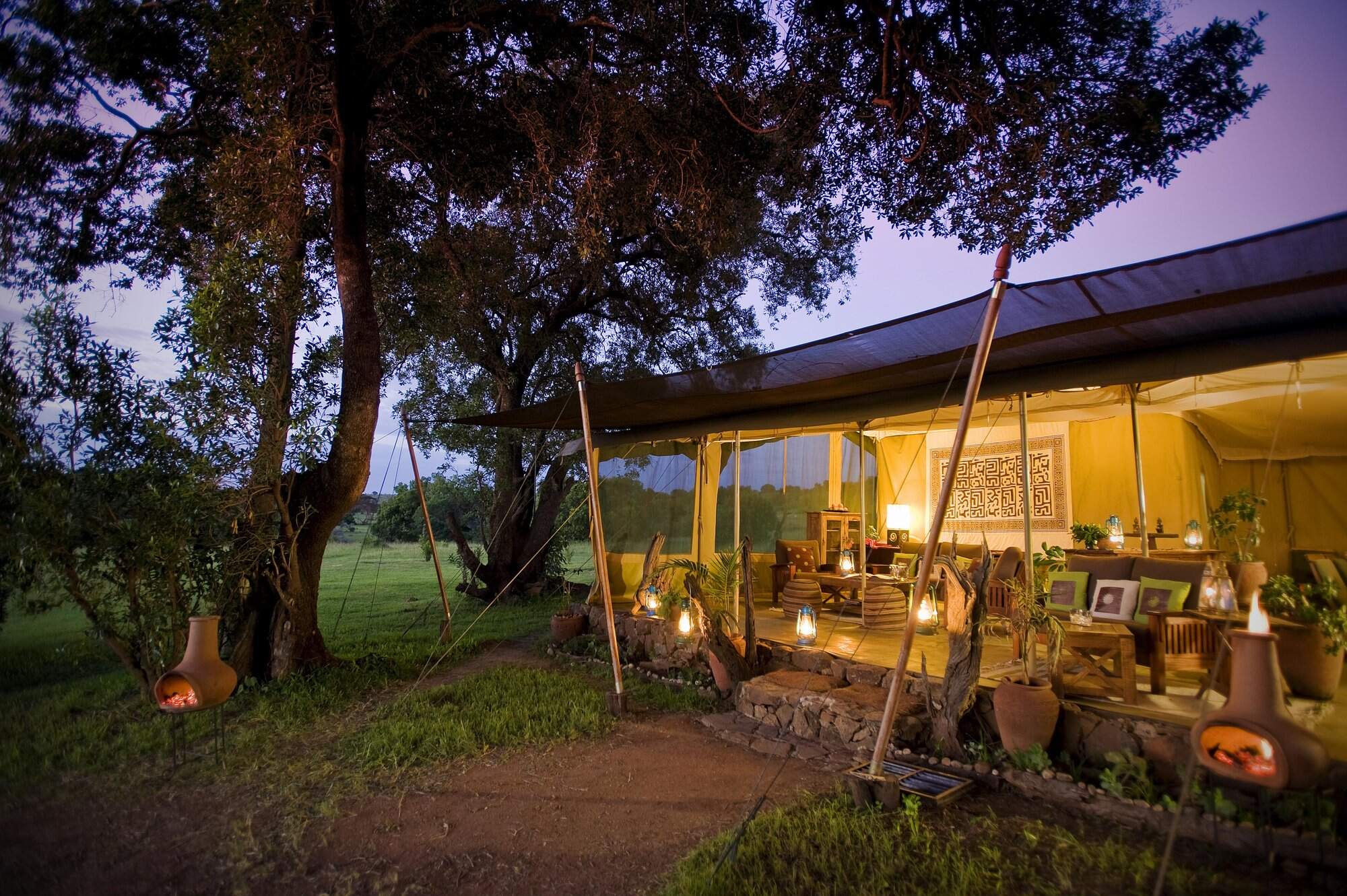
Kicheche Mara
Kicheche Mara Camp has just ten tents and a rustic and comfortable feel. It is set by a stream in a pretty area of the Mara ecosystem's Mara North Conservancy.
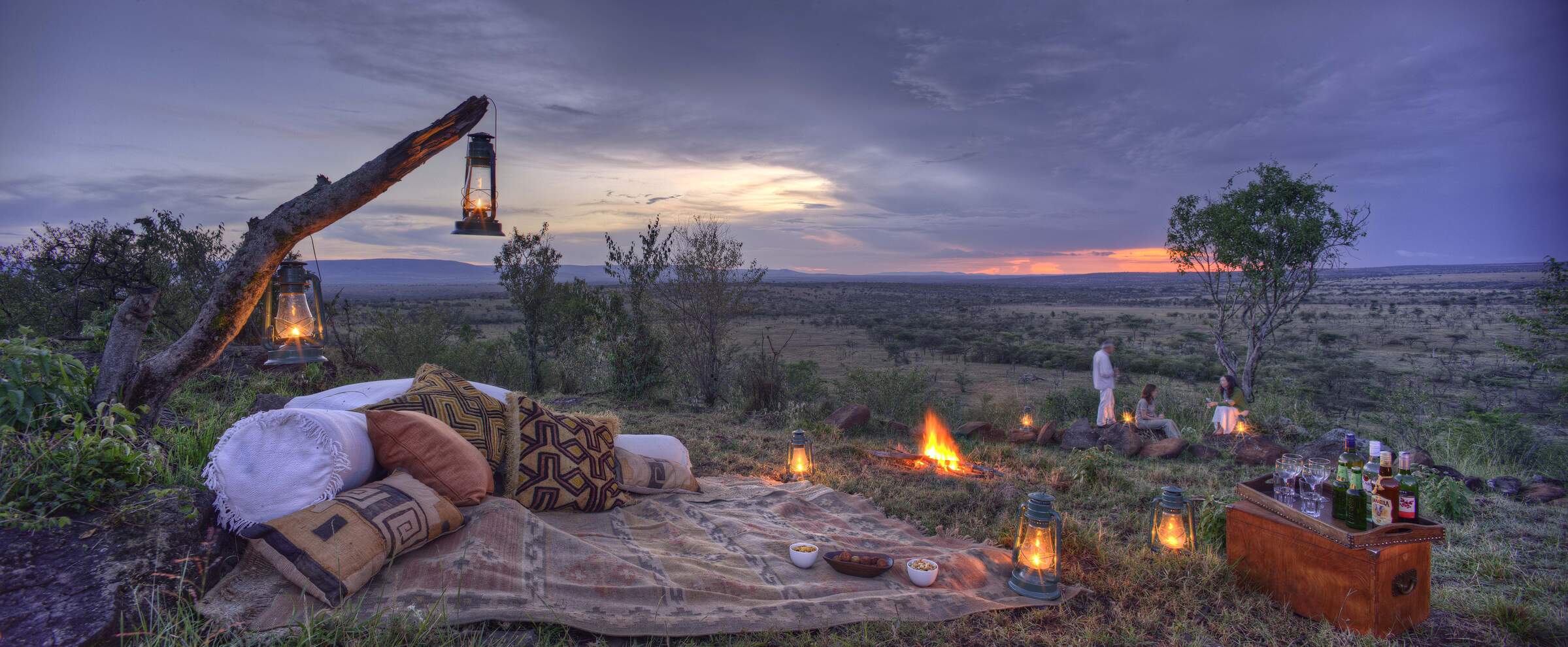
Kicheche Valley
Kicheche Valley is a boutique tented camp in a wooded district of the Mara ecosystem's Naboisho Conservancy, with plenty of wildlife in the area.
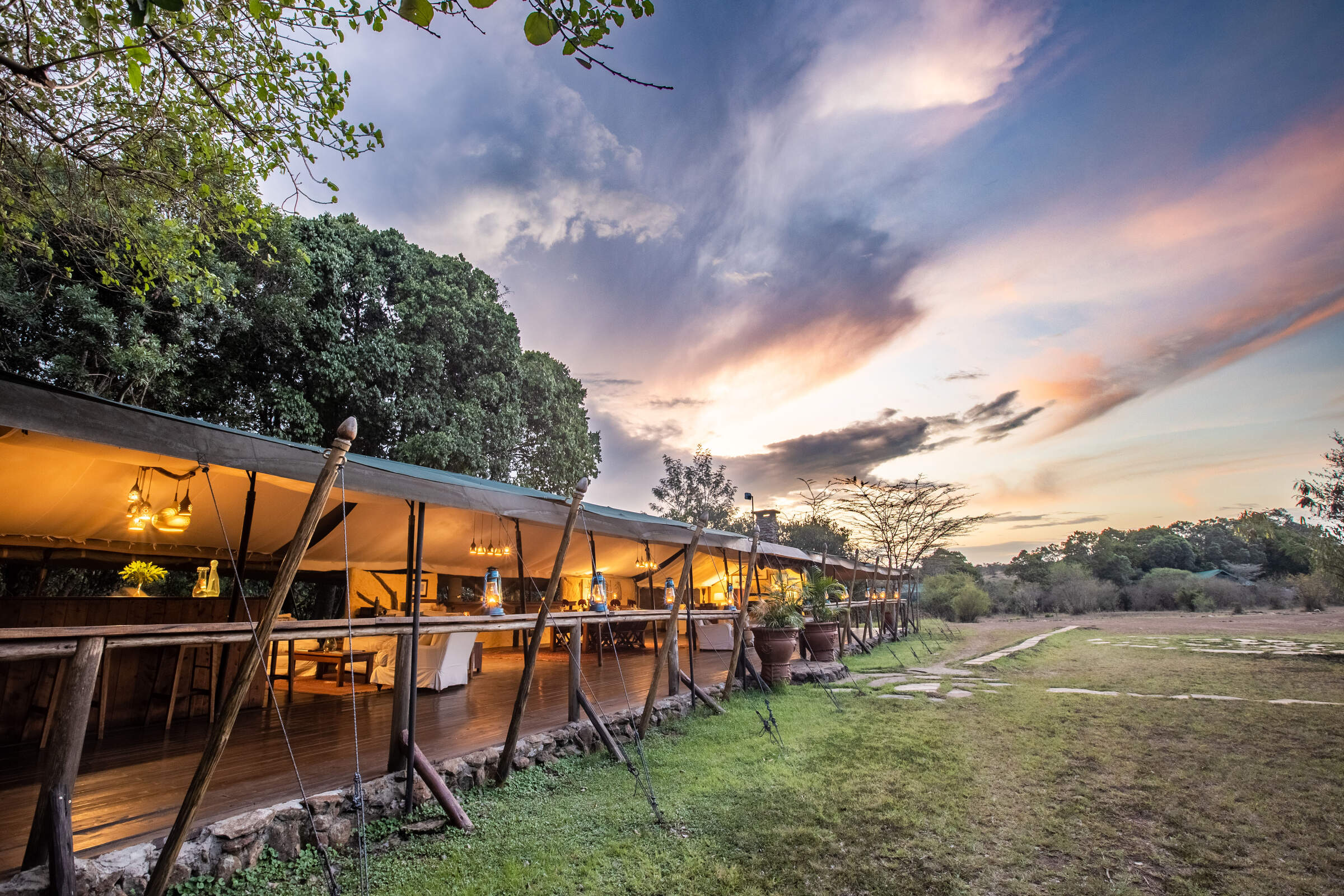
Offbeat Mara
Offbeat Mara is a small traditional camp that appeals to safari traditionalists, located in one of the Maasai Mara’s quiet conservancies.
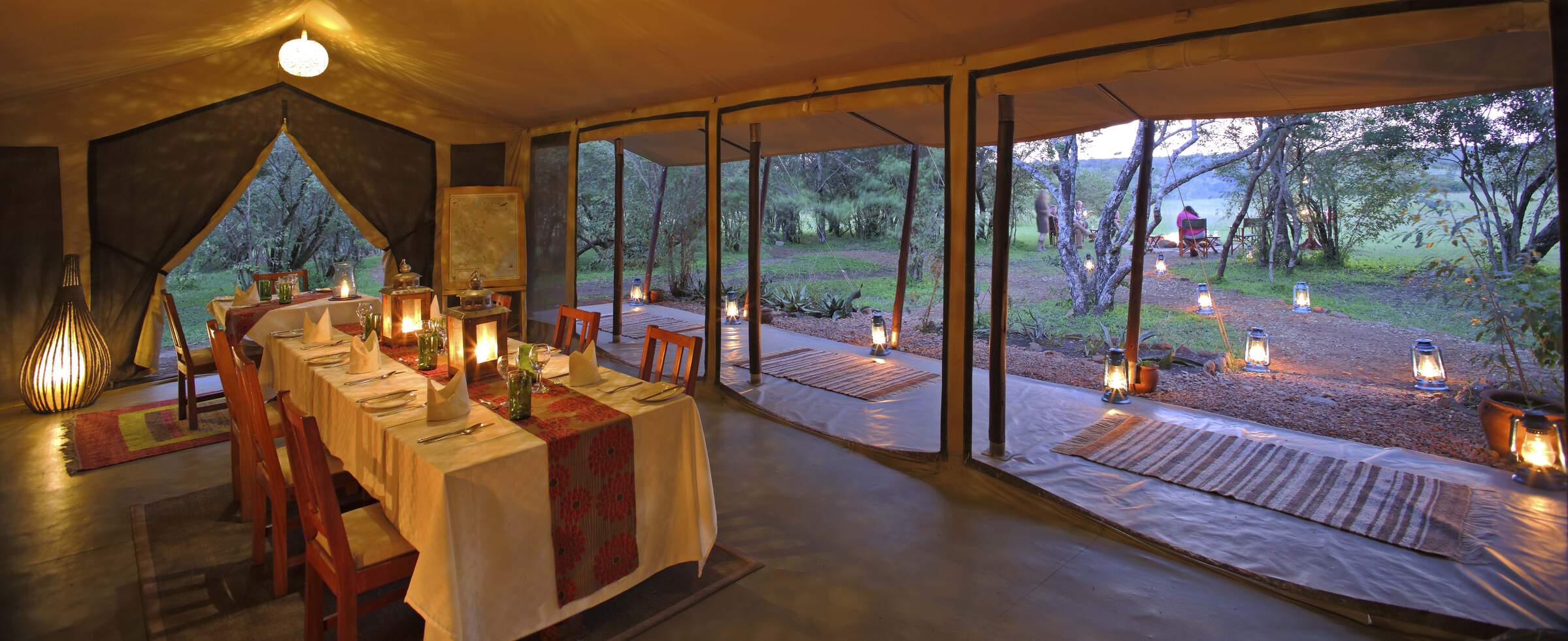
Encounter Mara
Encounter Mara is located in the private Naboisho Conservancy – a game-rich area of the Mara ecosystem – and offers a contemporary take on the traditional, low-impact luxury safari camp.
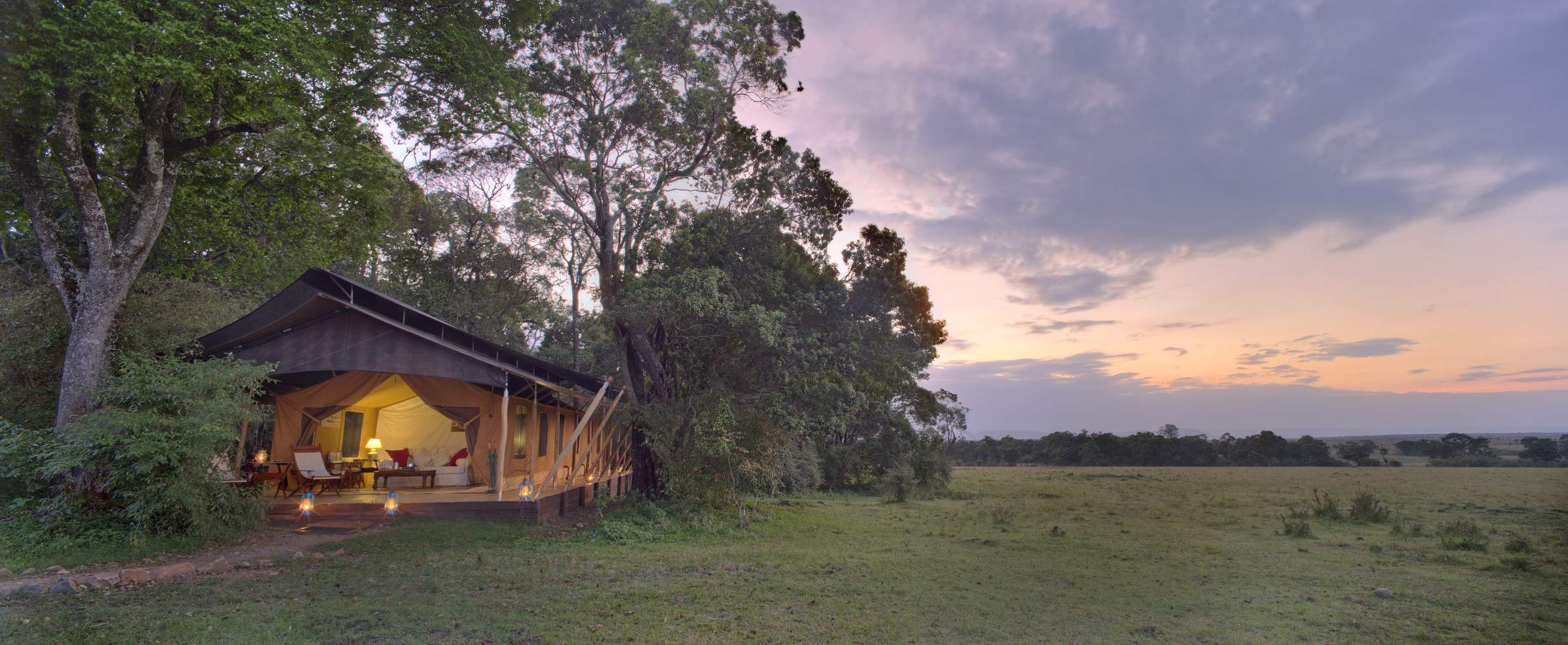
Elephant Pepper Camp
Elephant Pepper Camp is a small 10-tent bush camp, with a vintage safari style, a high level of service and excellent cuisine.
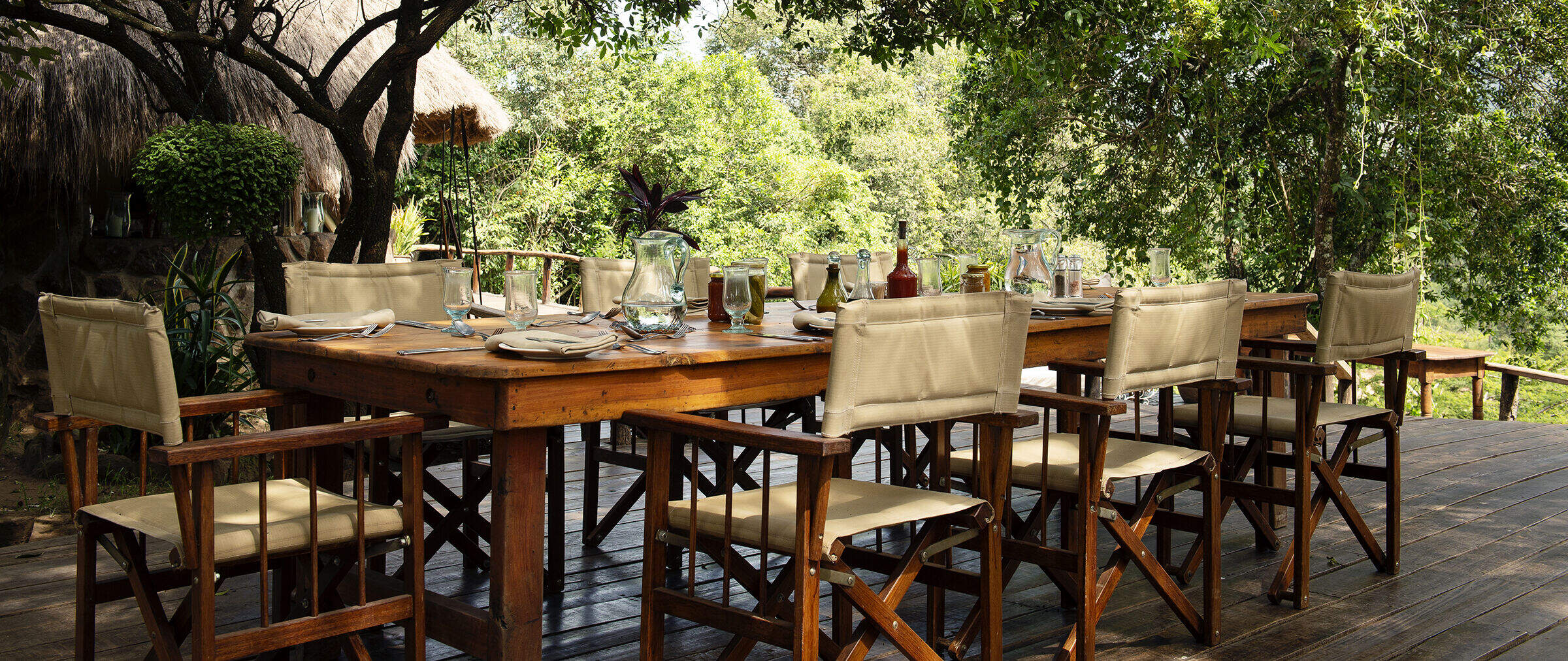
Serian
Serian is a luxury tented camp on the east bank of the Mara River in the Mara North Conservancy. It is the sister camp of Ngare Serian, on the west bank.
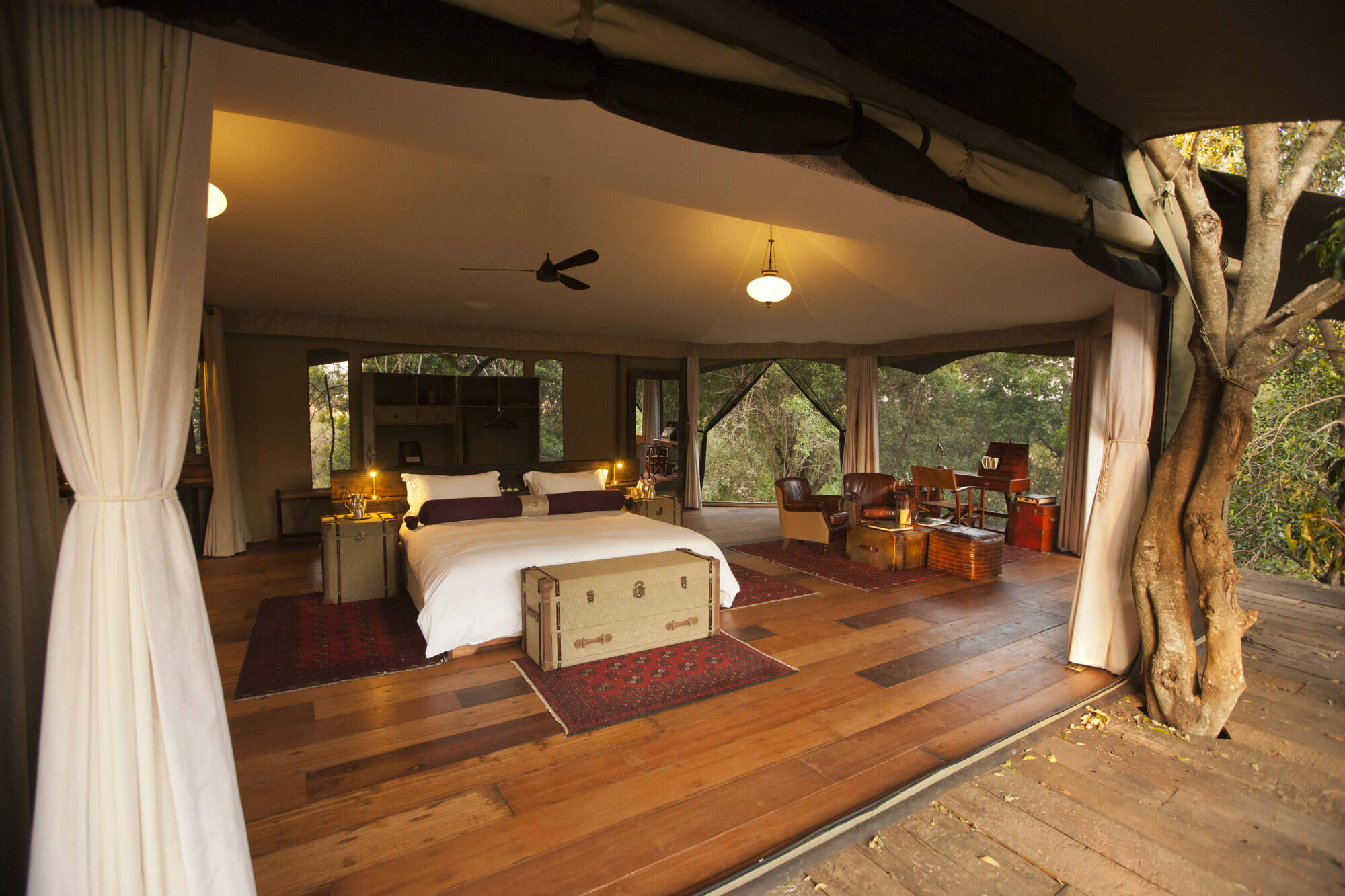
Mara Plains Camp
Mara Plains is one of the very best camps in the Mara ecosystem. Located in the Olare Motorogi Conservancy, just outside the Mara reserve, it has access to three wildlife-viewing areas.
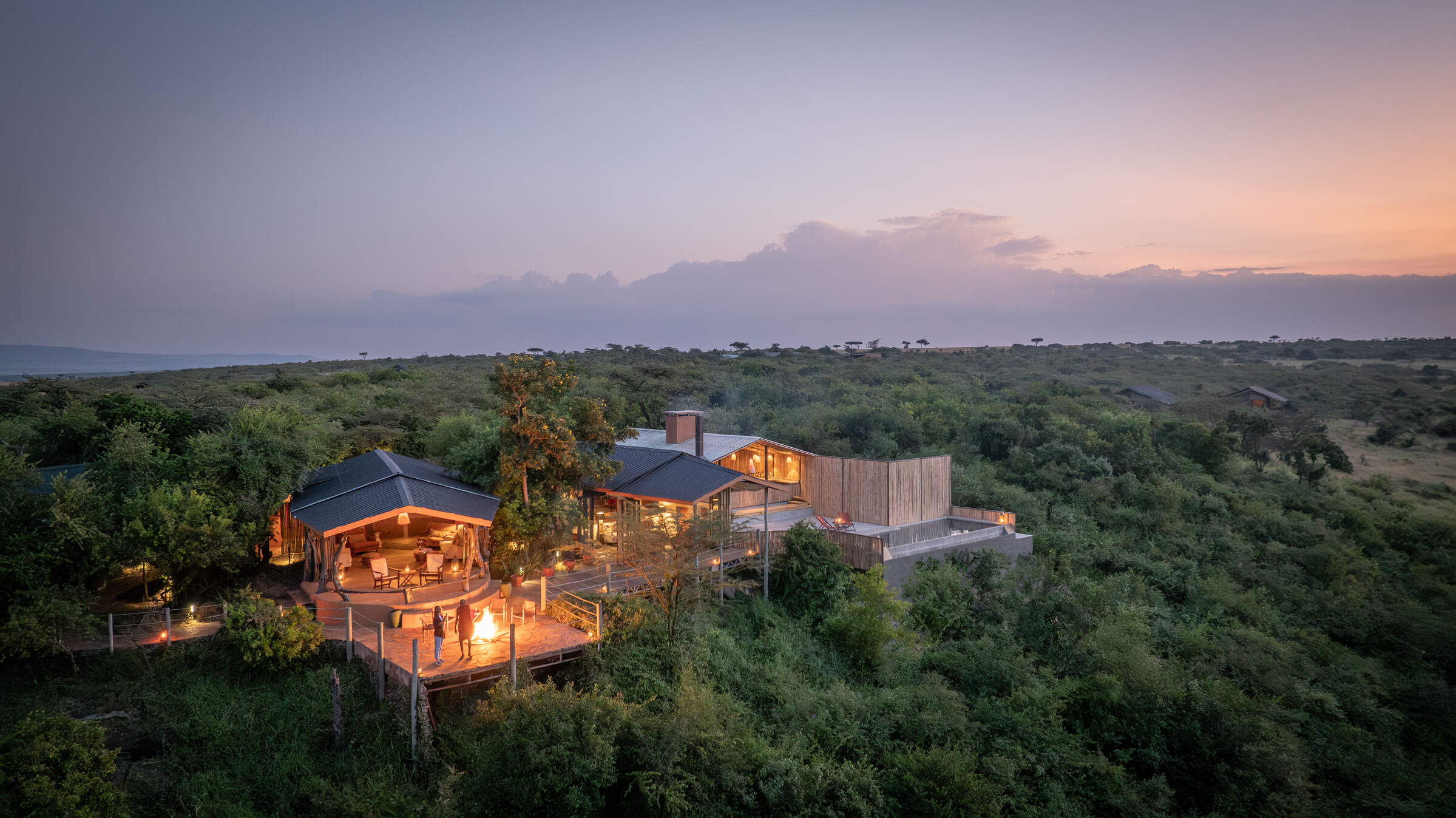
Basecamp Eagle View
Basecamp Eagle View is a community-focused safari camp in the Naboisho Conservancy, with a strong emphasis on responsible tourism and a spectacular location.
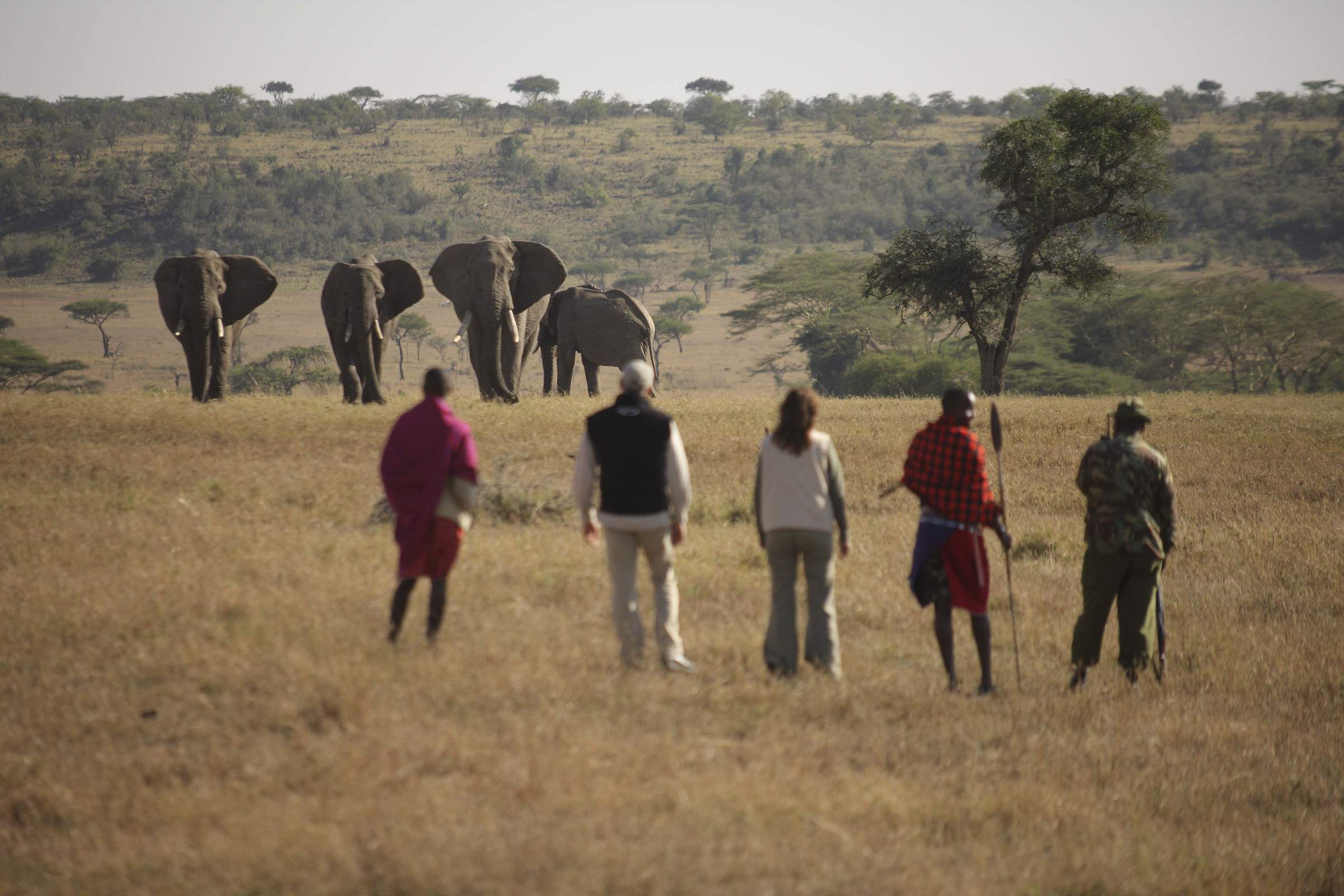
Kicheche Fly Camp
Kicheche Walking Wilderness Fly Camp is a temporaray dome tent camp set up for participants in Kicheche's two-day walking safari between Kicheche Valley and Kicheche Bush Camp.
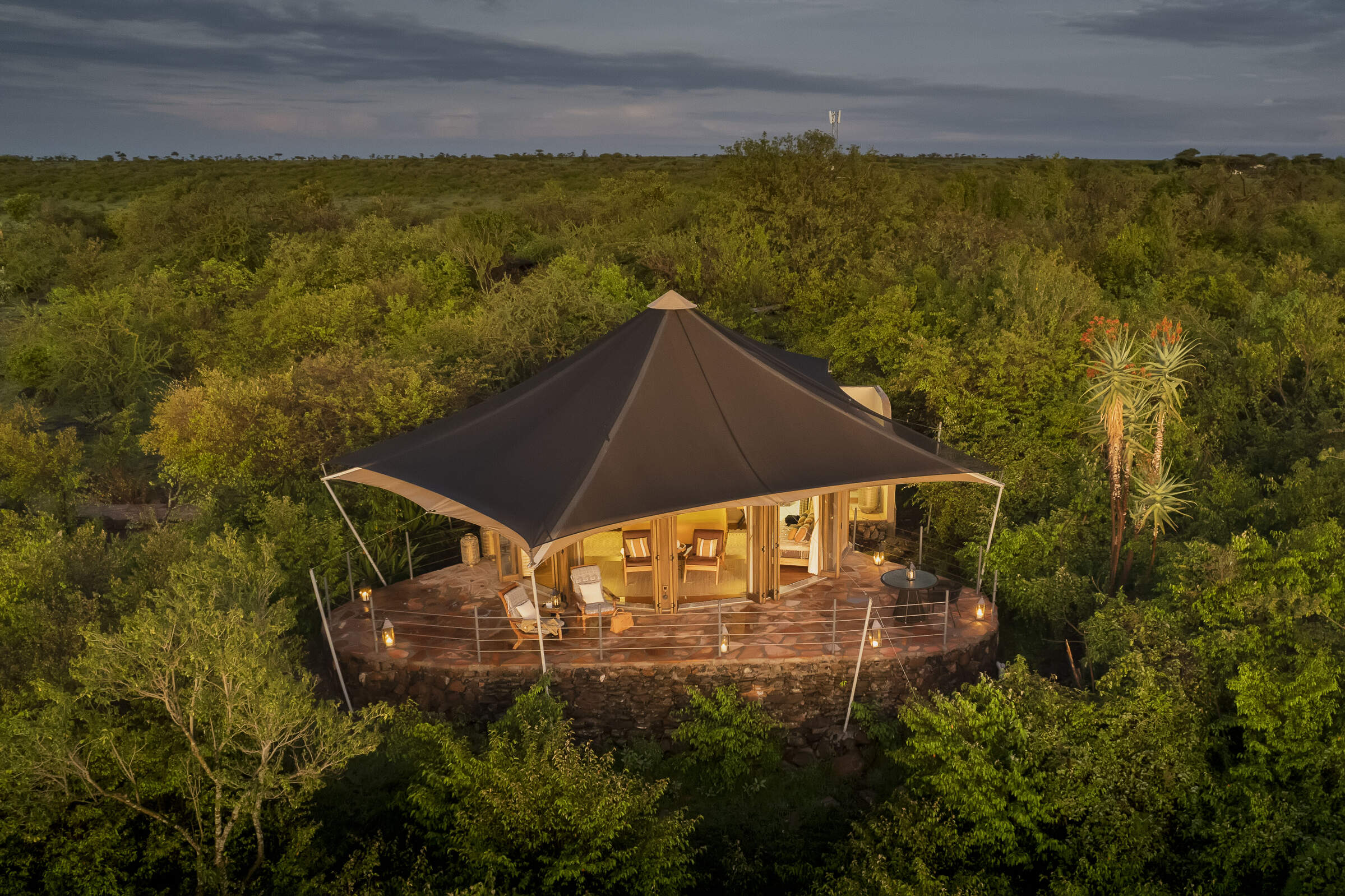
Hemingways Ol Seki
Magnificently located tented lodge on a bluff looking south across the Naboisho Conservancy toward the Maasai Mara National Reserve.
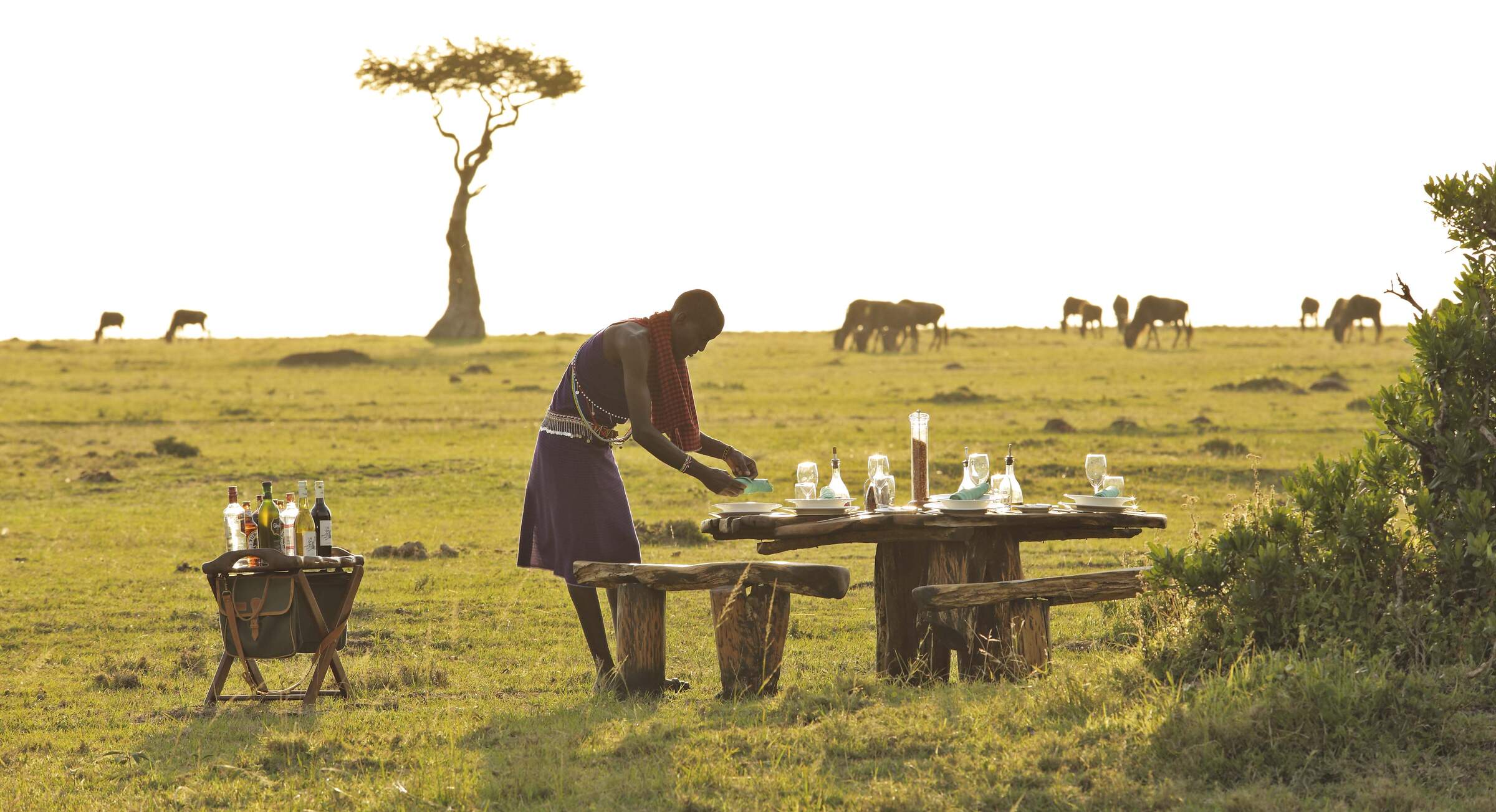
Saruni Wild
Saruni Wild is a rustic and traditional safari camp in the Lemek Conservancy, with just three tents and limited electricity.
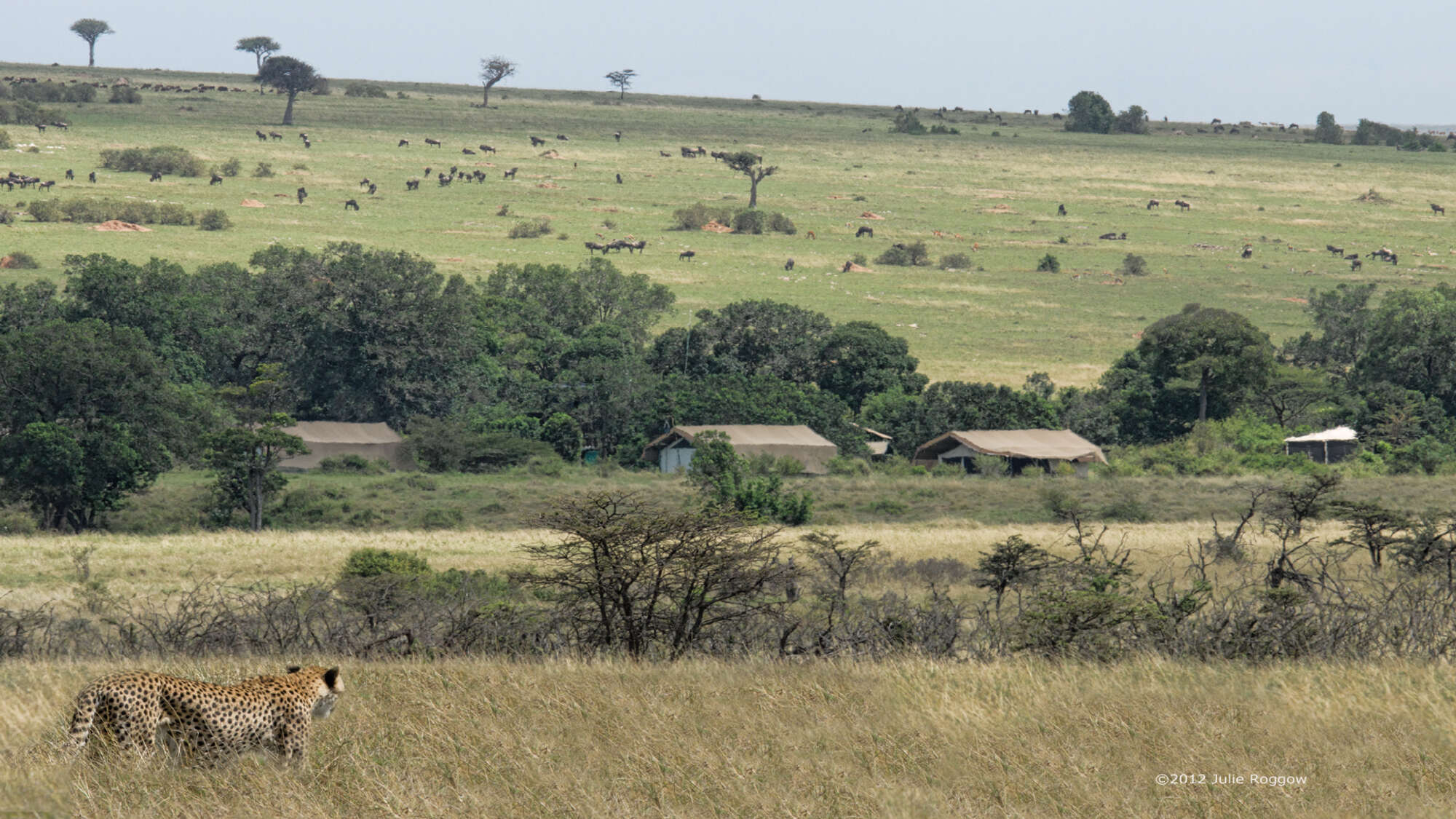
Porini Lion Camp
Porini Lion Camp is a pioneering, community focused eco-camp, with excellent guides and game viewing, in the predator-rich, Olare Motorogi Conservancy.
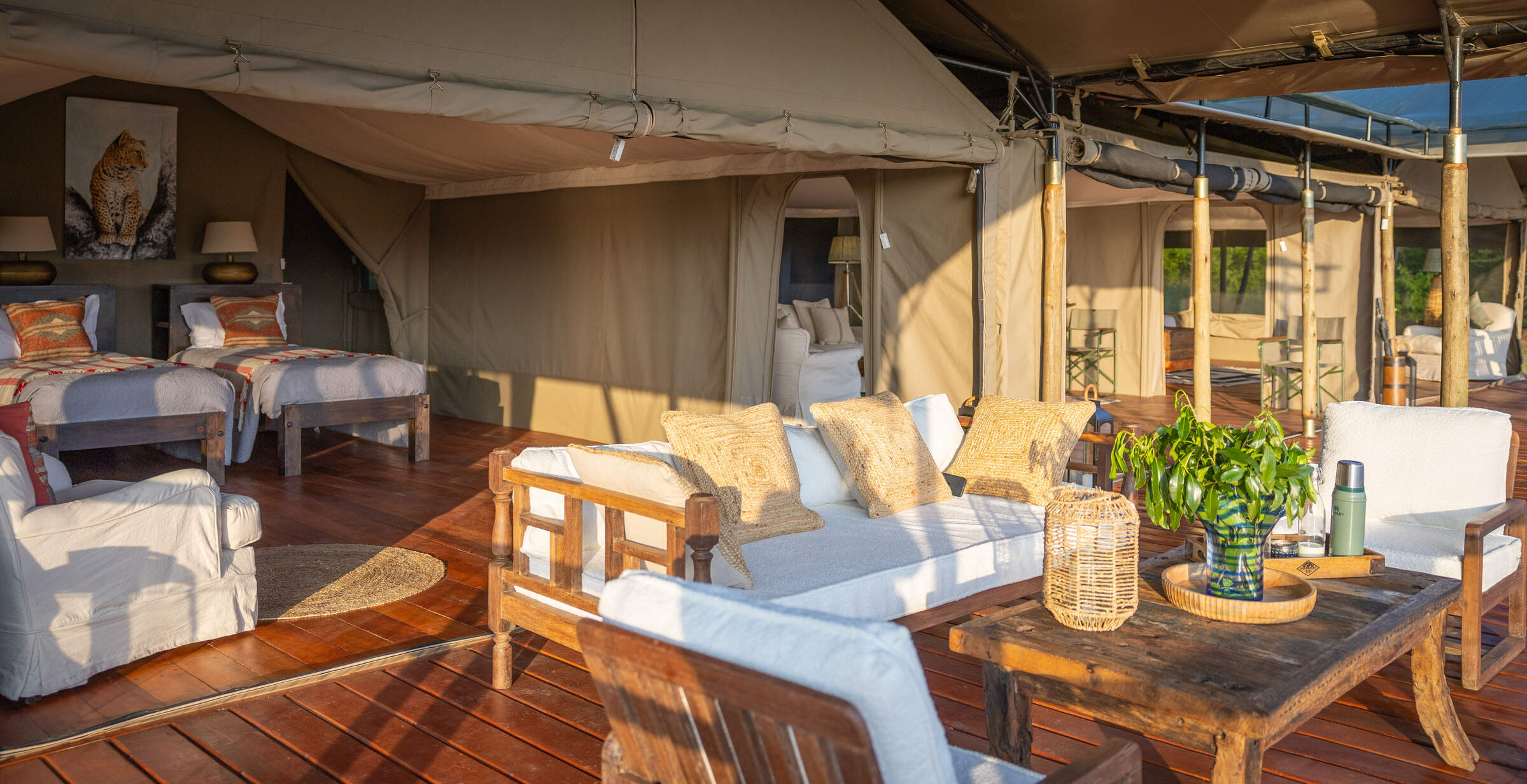
Offbeat Ndoto
Small and intimate, Offbeat Mara is set in a valley above the (often dry) Olare Orok River within the Mara North Conservancy.
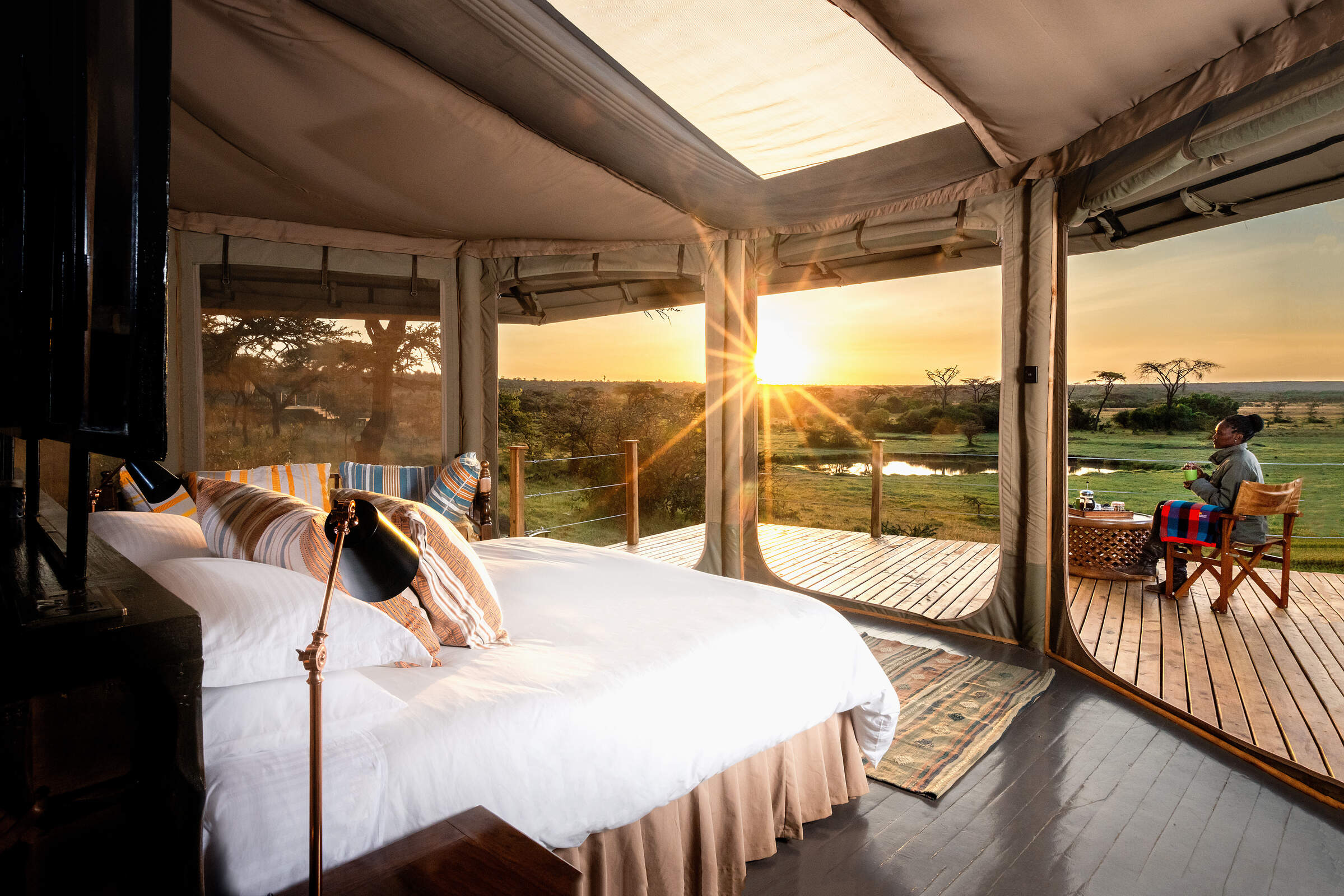
Basecamp Leopard Hill
With six beautiful tents, Basecamp Leopard Hill is a smart safari camp in the Naboisho Conservancy in the Maasai Mara ecosystem.
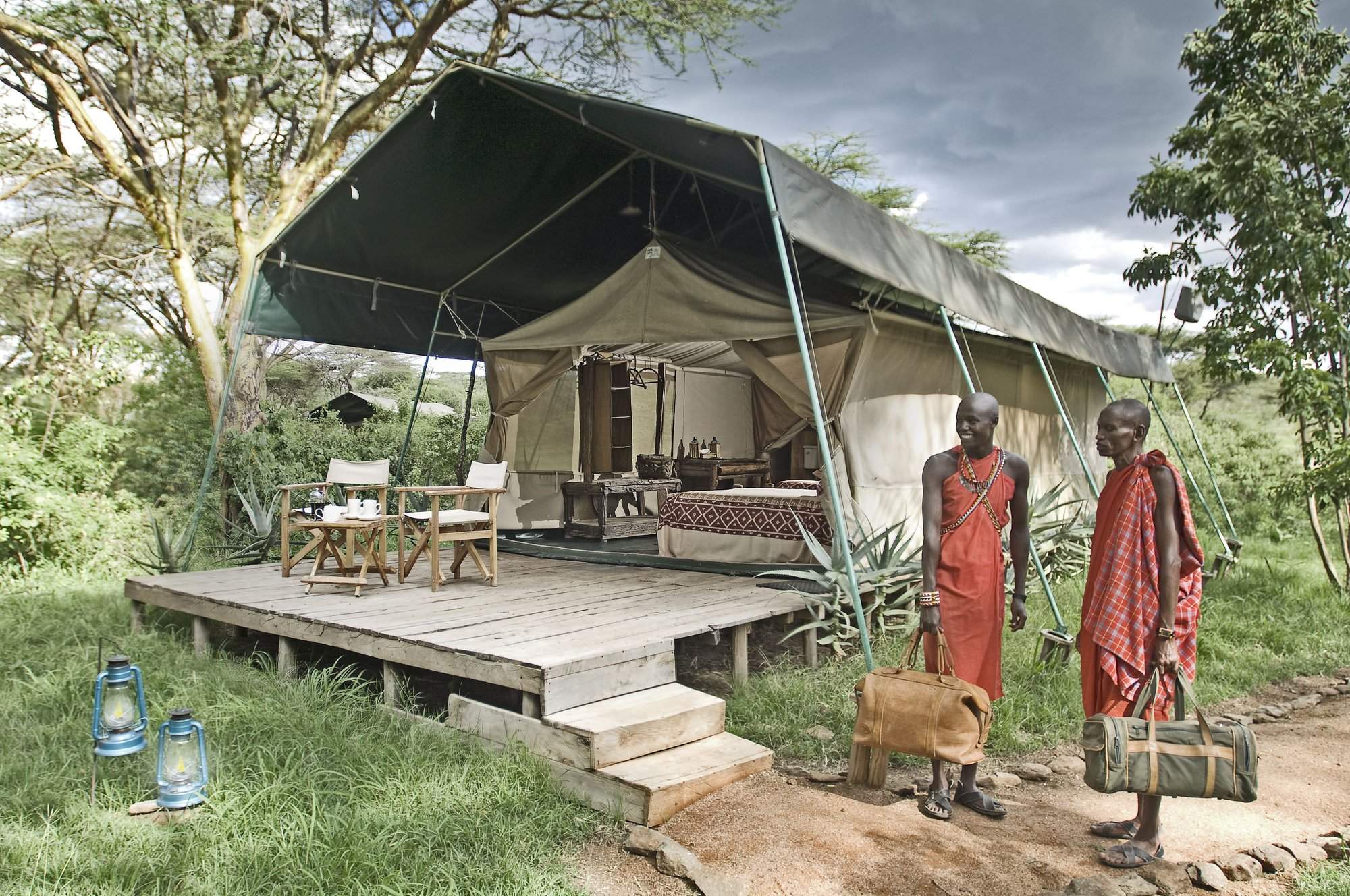
Porini Mara Camp
Porini Mara Camp is a small, pioneering eco-camp in the first private conservancy in the Mara region, with comfortable accommodation and a range of activities.
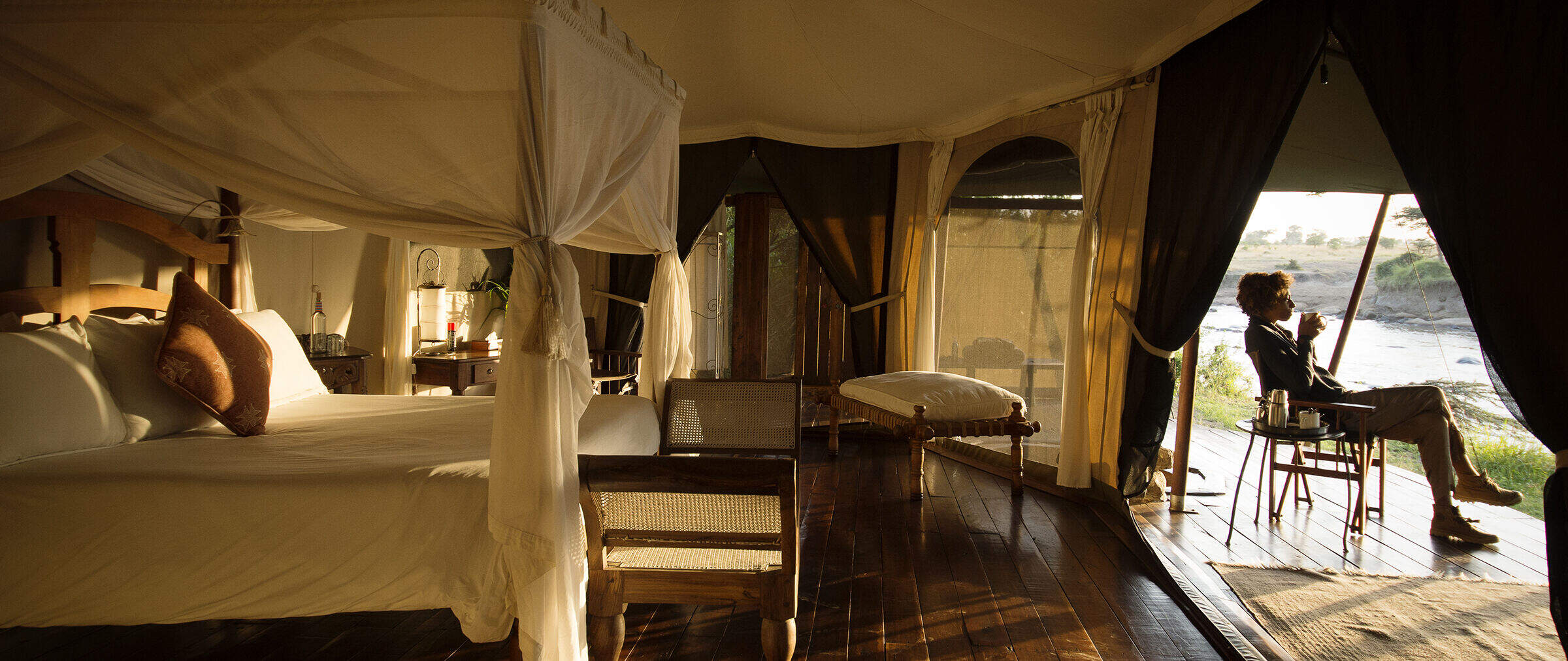
Ngare Serian
The luxurious Ngare Serian and its sister camp Serian face each other across the Mara River on the western side of the Mara North Conservancy
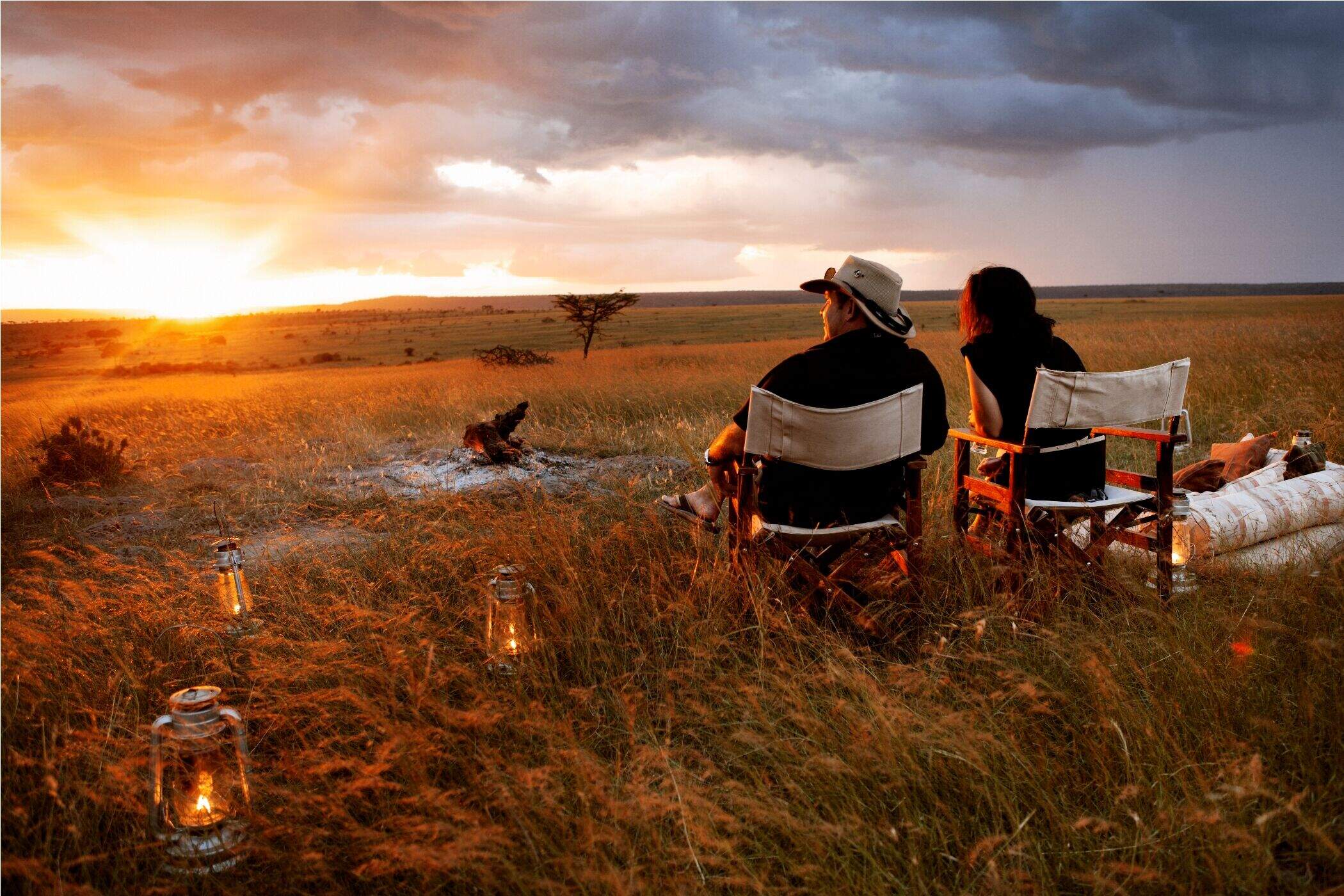
Karen Blixen Camp
Karen Blixen Camp sits on a meander of the Mara River in the Mara North Conservancy, just beyond the northern boundary of the Maasai Mara National Reserve.
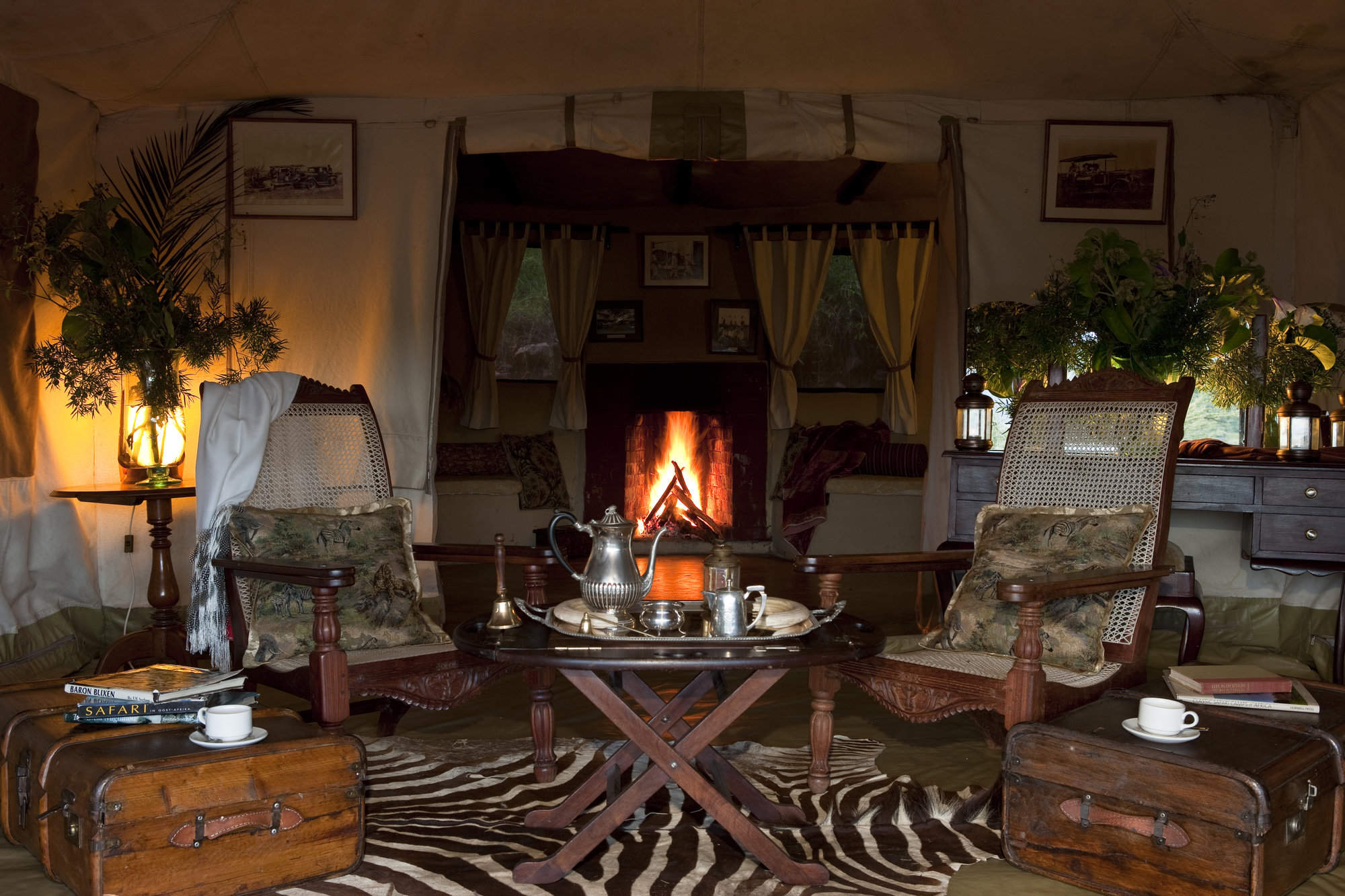
Cottars 1920s Camp
Cottar's 1920s Camp is a classic, luxury tented camp with a 1920s safari theme, located in its own conservancy on the southeast border of the Maasai Mara National Reserve.
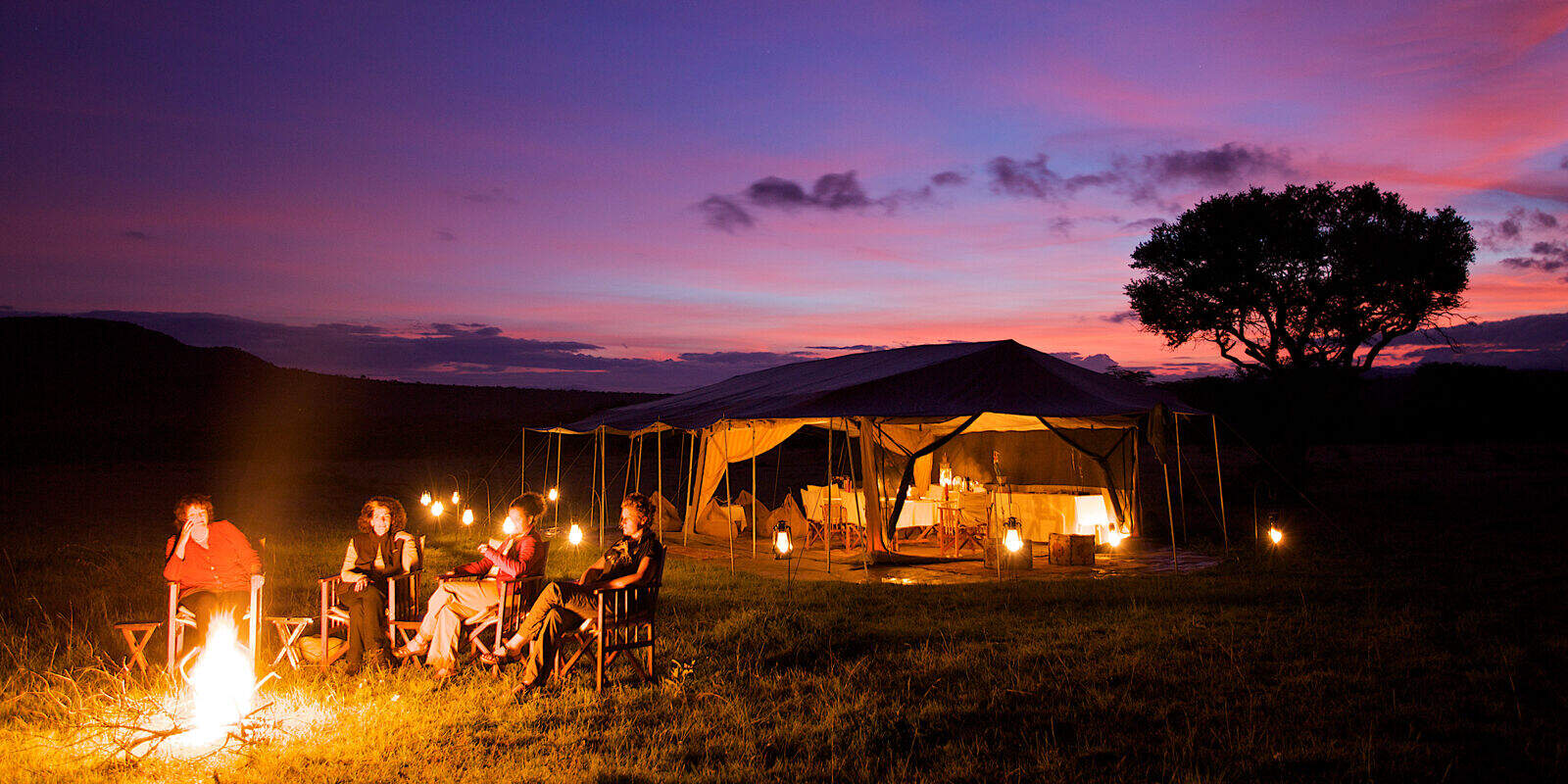
Leleshwa
Leleshwa was a delightful, boutique safari camp on the picturesque banks of a tributary of the Talek, with an extensive, little visited game area on its doorstep.
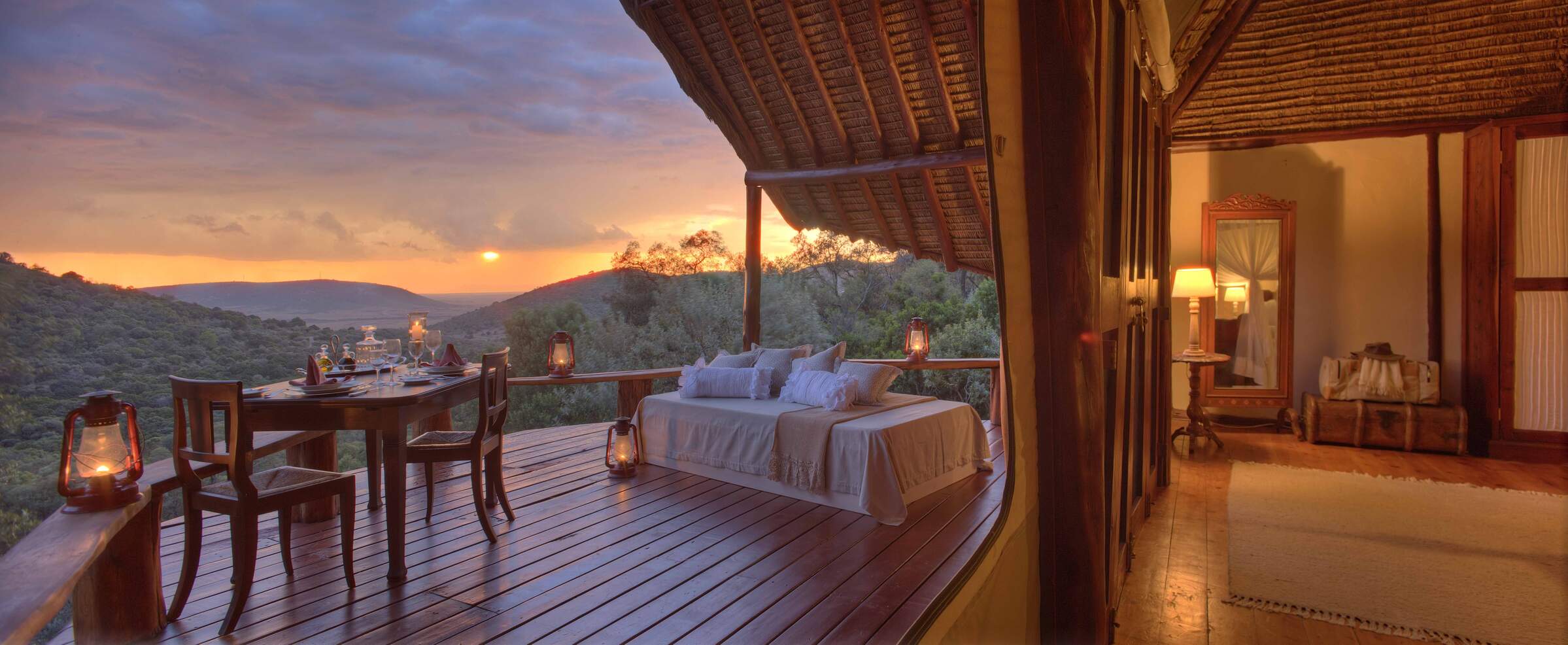
Saruni Mara
Saruni Mara is a luxurious permanent lodge, on the remote northern edge of the Mara North Conservancy, with stunning views, good guiding and very private and comfortable rooms.
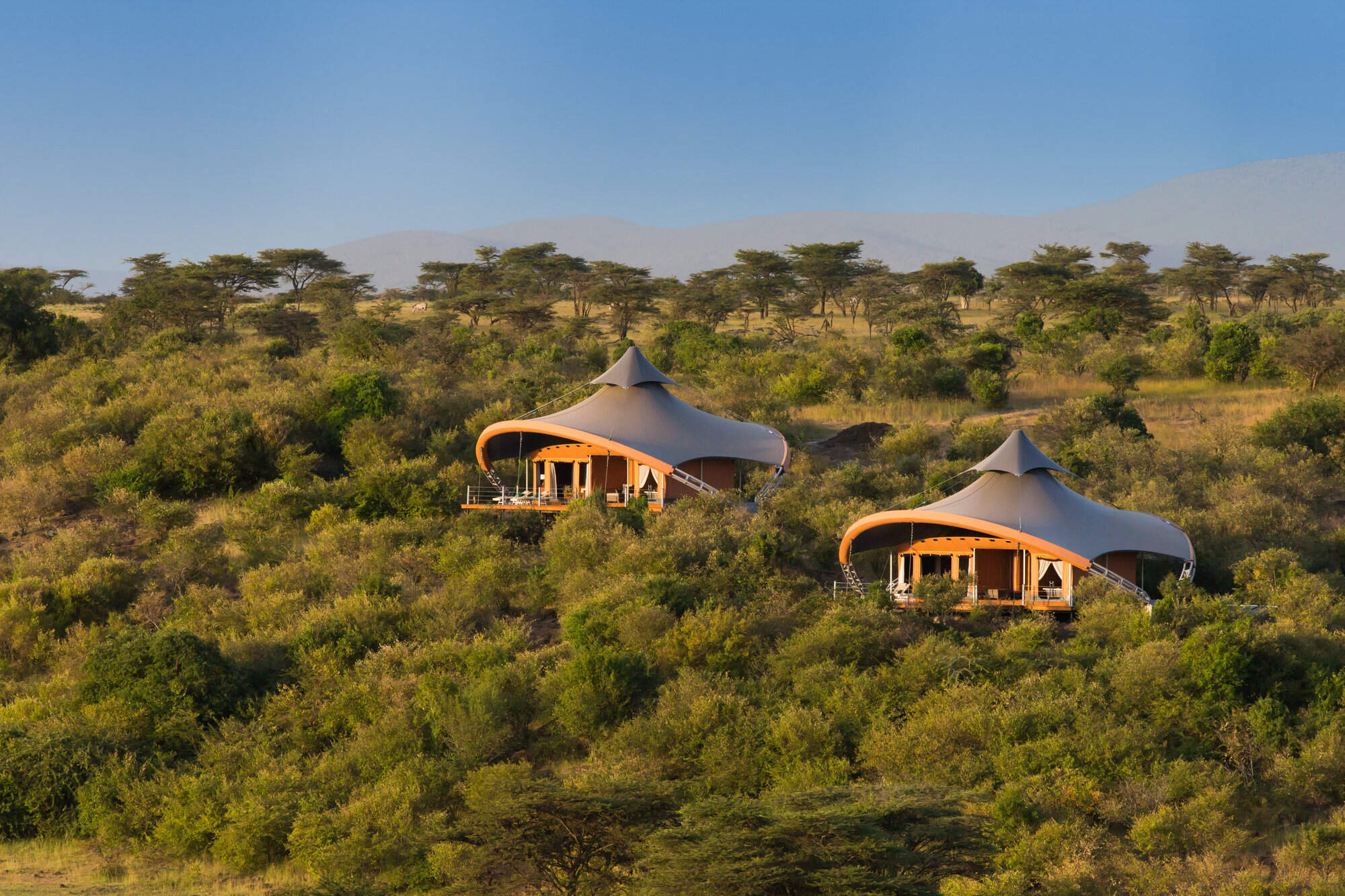
Mahali Mzuri
Mahali Mzuri is a strikingly modern tented camp in the Virgin Limited Edition group, in a remote part of the Mara ecosytem's Olare Motorogi Conservancy. It has lovely views and all the luxuries of a five-star hotel.
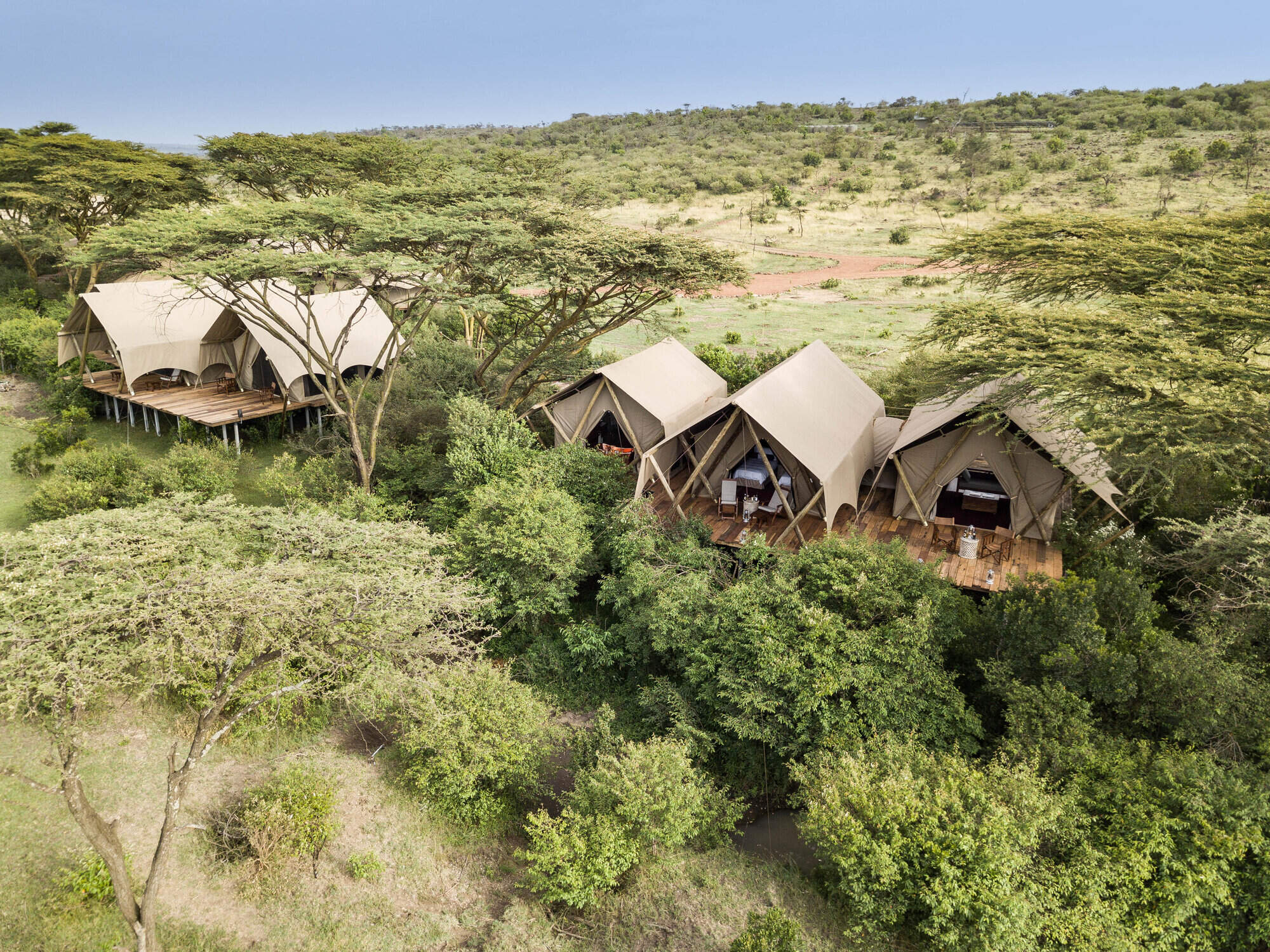
Mara Nyika
Mara Nyika is one of the newer additions to the Naboisho Conservancy and offers a luxurious and exclusive safari.
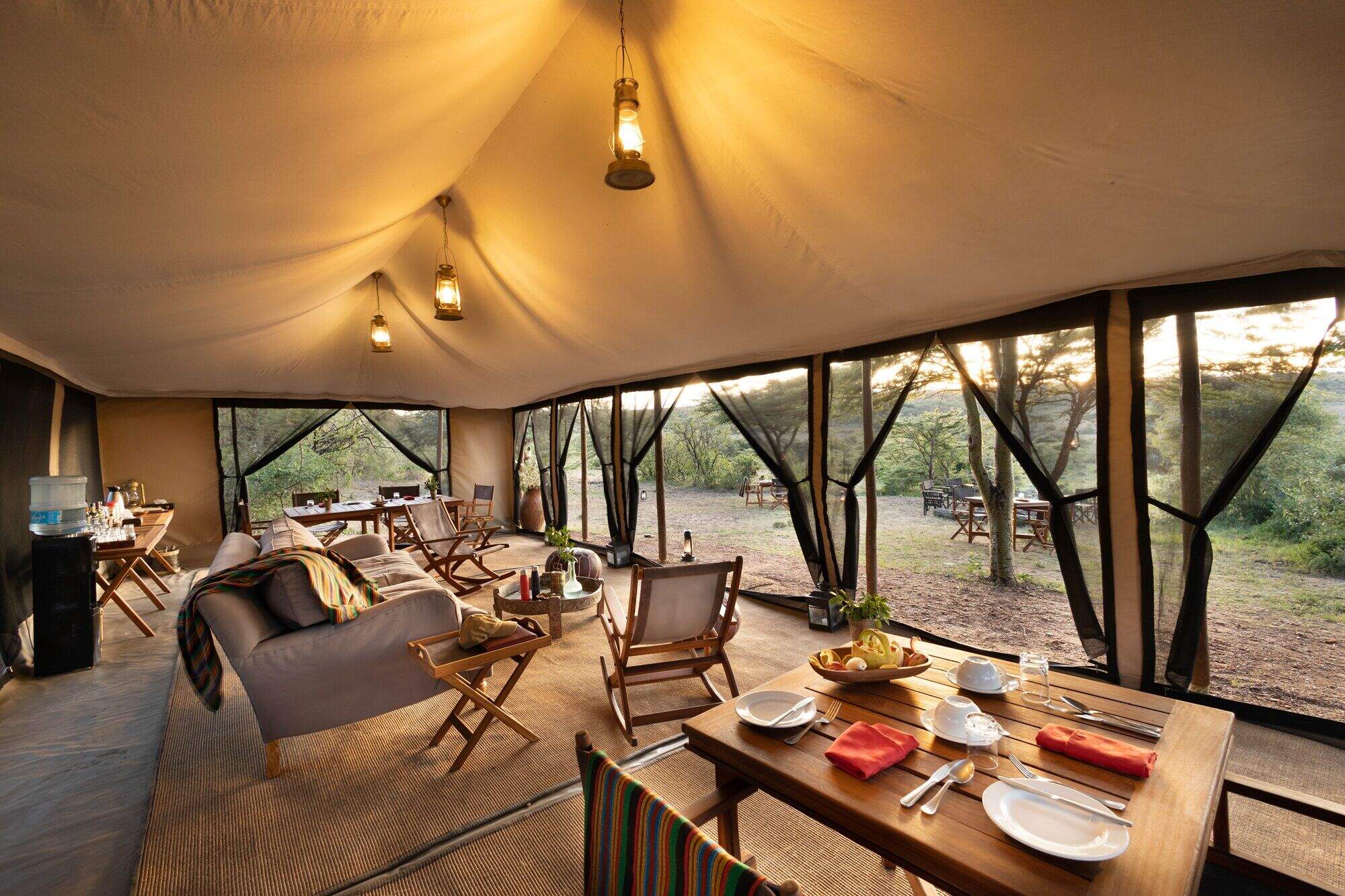
Basecamp Wilderness
Basecamp Wilderness Camp is a simple, traditional tented camp, set in a remote valley in the Naboisho Conservancy in the Mara ecoystem.
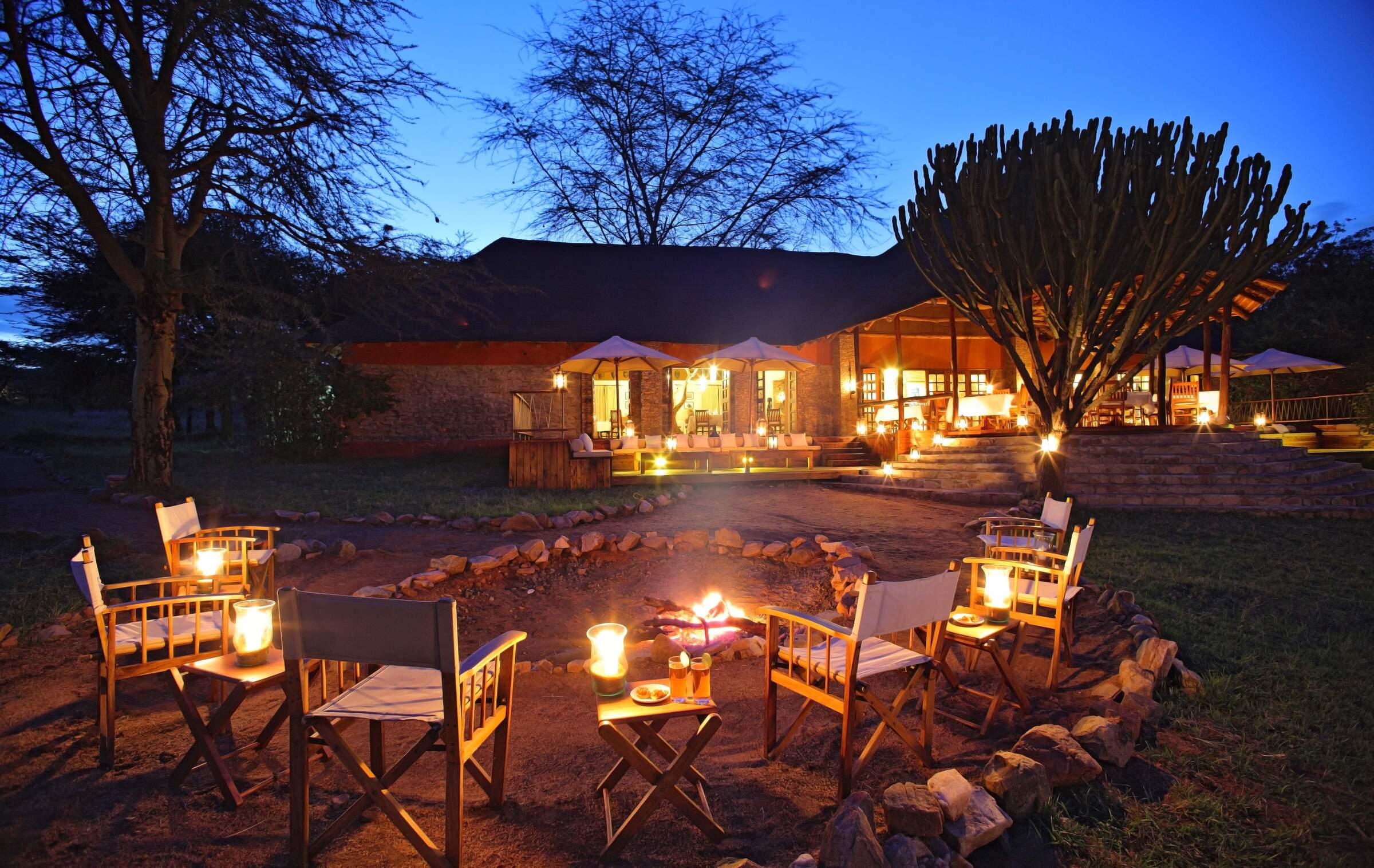
Mara Bushtops
Mara Bushtops is a luxury safari hotel on a private concession, outside the Maasai Mara National Reserve, with the emphasis on comfort, relaxation and good food and wine.
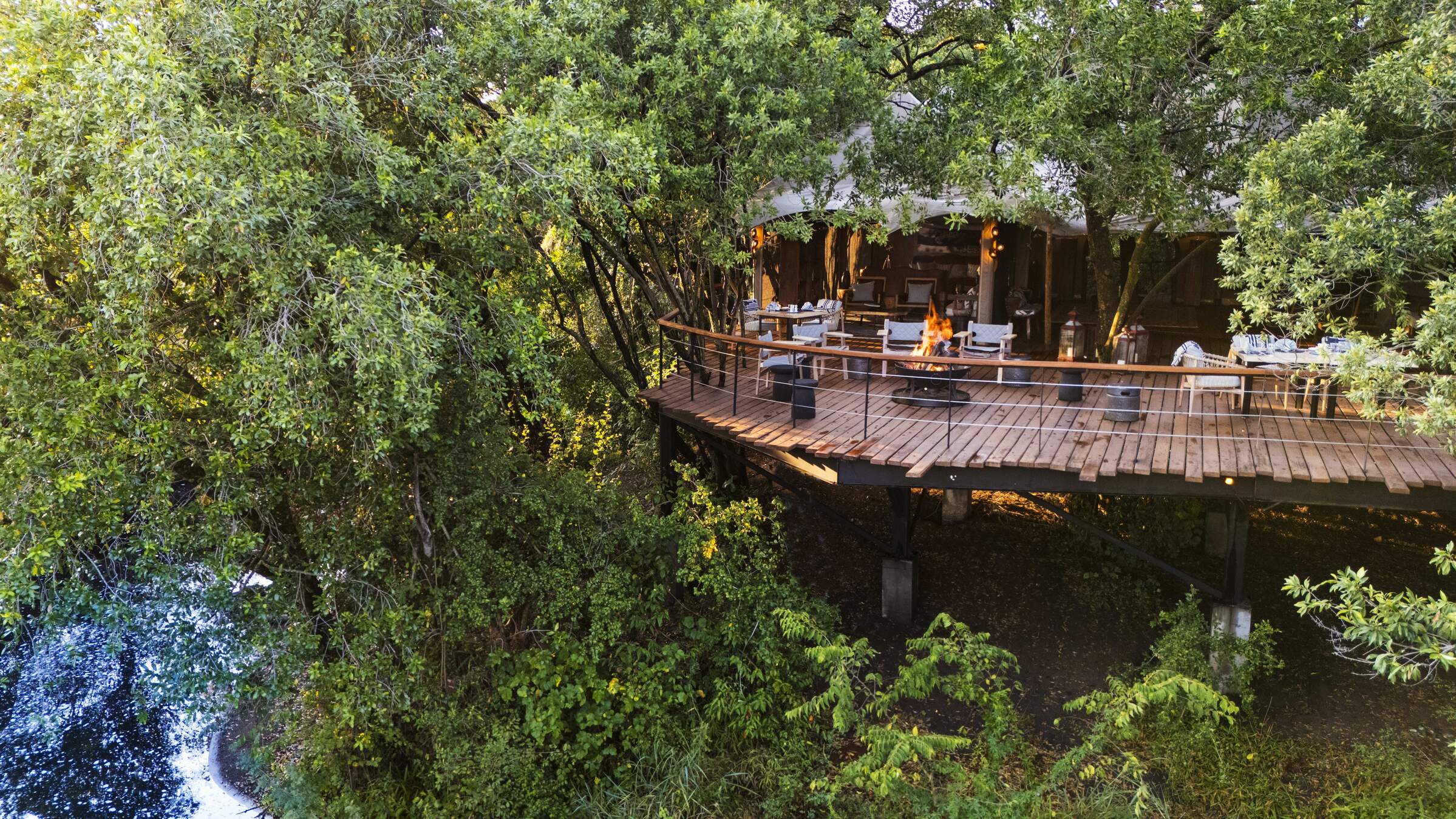
Mara Toto Tree Camp
Mara Toto Tree Camp is located on a wooded bend of the Ntiakatek River, 1km south (as the pied crow flies) from its sister camp, Mara Plains. It's the offspring of the original "Mara Toto" which was swept away in floods.
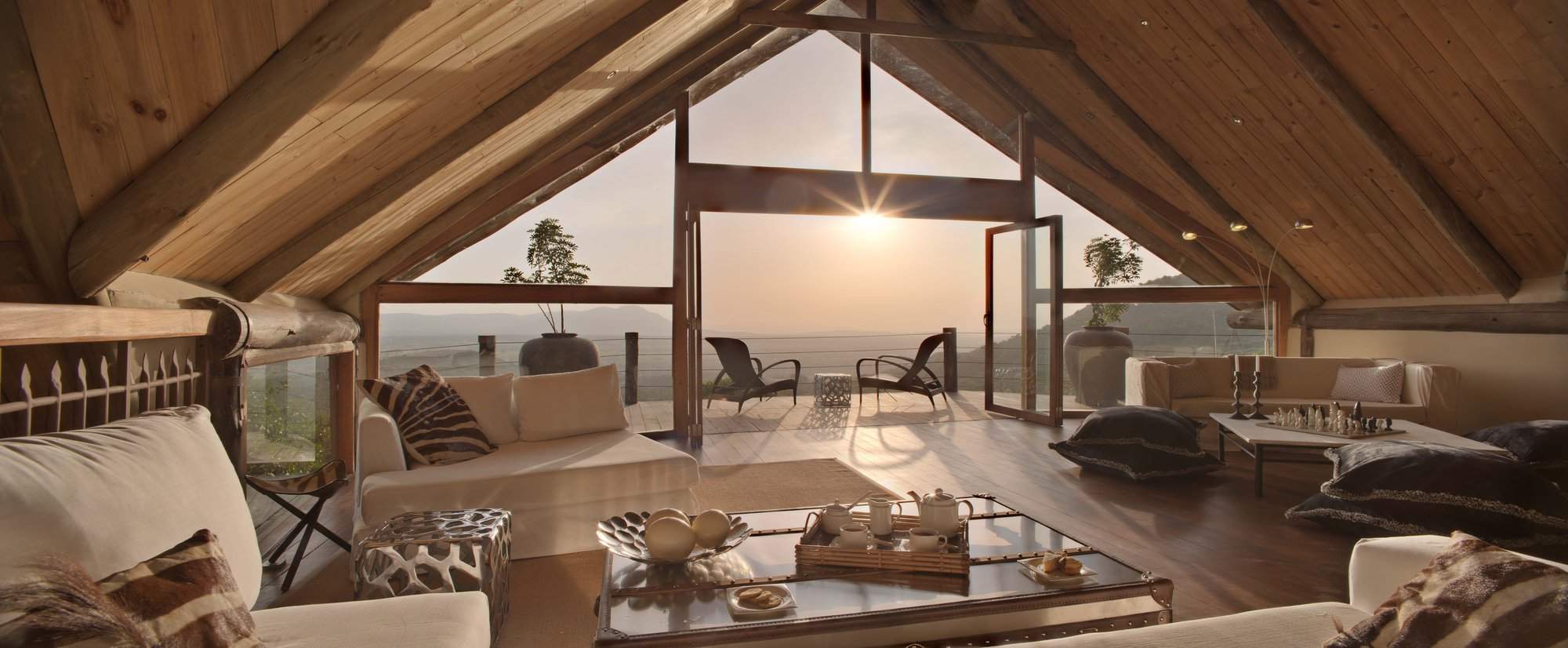
Cottars Private House
Cottar's Private House is one of the few truly luxurious, modern private houses in the Mara ecosystem, spoiling its guests with first-rate staff, a swimming pool and wonderful views.
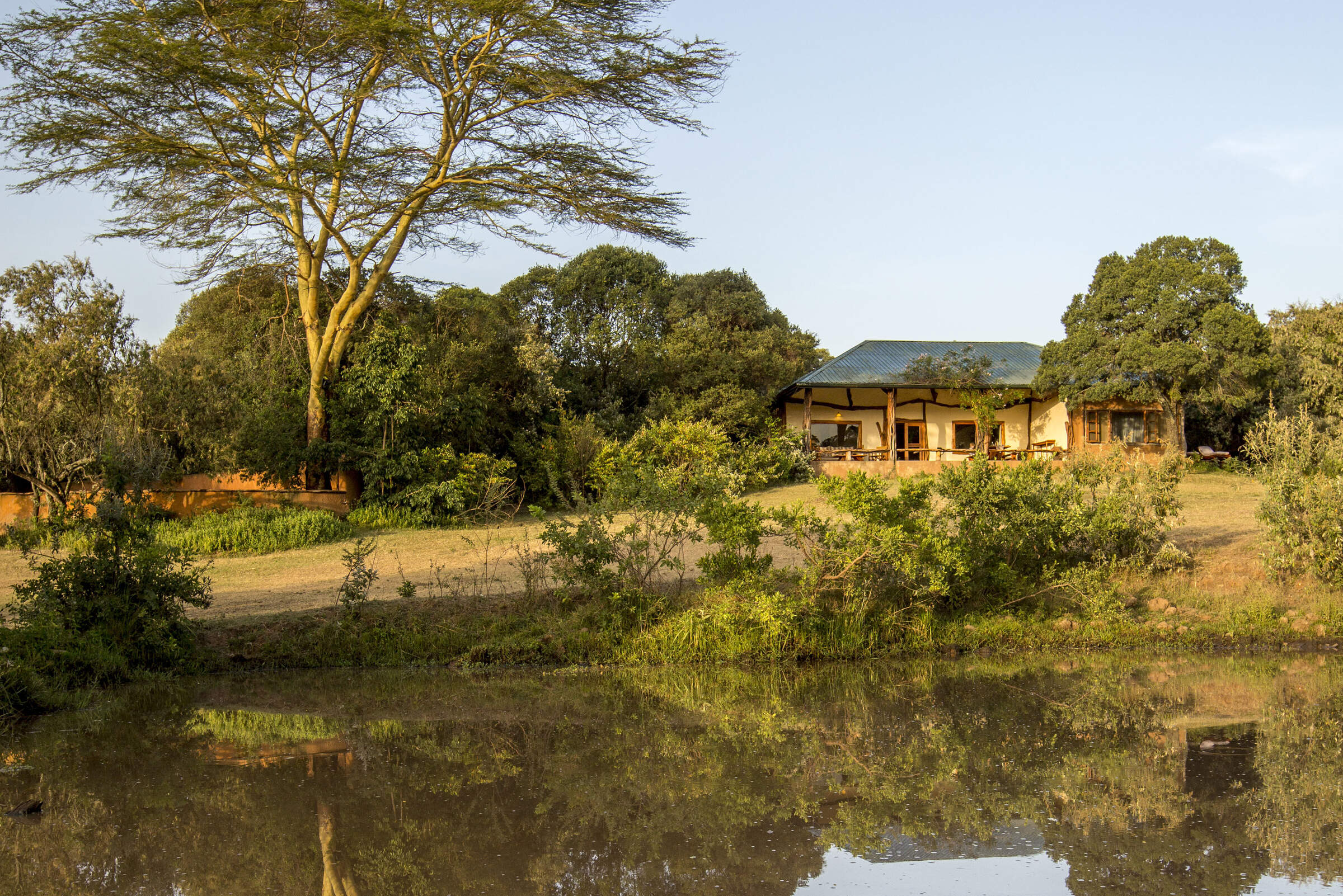
Basecamp Mara Houses
Basecamp Mara Houses consists of three private houses located in the northernmost part of the Mara North Conservancy.
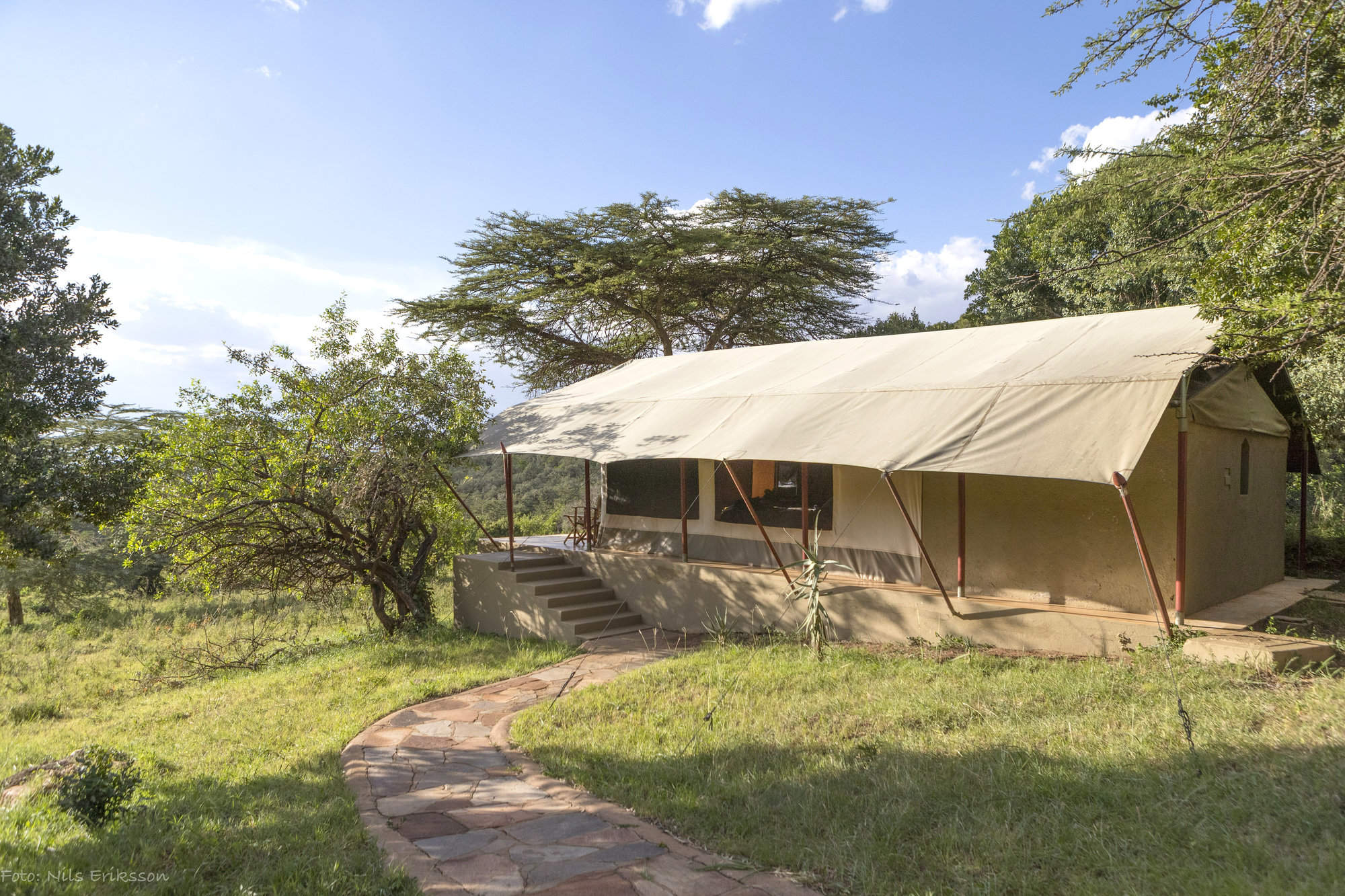
Entumoto
Entumoto is a high-end tented camp, with a swimming pool, situated in a very pretty location on the east side of the Maasai Mara ecosystem.
When to go to Maasai Mara Conservancies
Our month by month guide: What it's like to visit Naboisho Camp in Maasai Mara Conservancies
Jan
Feb
Mar
Apr
May
Jun
Jul
Aug
Sep
Oct
Nov
Dec
Kenya in January
Clear, hot days and warm nights make this high season a popular time for safaris and it’s also good for diving and snorkelling as water clarity is excellent and gets better as the dry season progresses. Most lodges and tented camps treat January after the New Year week is over, as mid-season, making it a good compromise in terms of value for money with reasonably reliable, dry weather and some greenery left in the landscape.
Expert Africa bases its description of climate and weather in January, like the other months of the year, on the climate records of roughly the last 100 years, and it's fair to say that the weather and seasons since the beginning of this century have been highly irregular and unpredictable.
- On average, January is the second driest month of the year
- Elephants dig waterholes in the dry riverbed in the Samburu reserve.
- Wildebeest and many antelope have their calving season, to February.
- Migrant birds are seen in huge numbers, especially in the Rift Valley.
- Sea water clarity around the coral reefs generally good.
Our view
Fantastic: the very best time to visit
Weather in January
Kenya in February
With the short dry season well established, the grass grazed down and wildlife gathering close to water points, this is still a good time for a safari. Good water clarity in the Indian Ocean's coastal waters makes for excellent diving and snorkelling conditions.
Expert Africa bases its description of climate and weather in February, like the other months of the year, on the climate records of roughly the last 100 years, and it's fair to say that the weather and seasons since the beginning of this century have been highly irregular and unpredictable.
- On average, February is the driest month of the year.
- It’s sometimes possible to swim with whale sharks at Diani Beach.
- Migrant birds are still seen everywhere, especially near water.
- This is usually peak calving season for wildebeest and many antelopes.
- This month is often the hottest of the year, especially on the coast.
Our view
A very good time to visit
Weather in February
Kenya in March
Hot, increasingly humid weather – with good diving and snorkelling conditions at the start of the month – gives way to rains and lower accommodation costs. Expert Africa bases its description of climate and weather in March, like the other months of the year, on the climate records of roughly the last 100 years, and predicting the seasons since the beginning of this century has been difficult.
March is the month when – traditionally – intensely hot conditions build up until a cloudburst finally happens at the end of the month or in early April, to relieve the humidity. As ever, regional variations across the country can greatly impact on visitors' experiences.
- Sea-water clarity is best for diving before the long rains start.
- Visitor numbers are low, though the Easter holidays can be busier.
- Night skies can be scintillatingly clear in early March.
- Cropped down savannah grasses can make it easier to see the wildlife.
- Temperartures climb high, especially at lower elevations.
Our view
A good time to visit, with pros & cons
Weather in March
Kenya in April
April sees the full onset of the southeast monsoon wind or kusi, which heralds the long rains. Temperatures drop soon after the rains are established and you’ll often have facilities largely to yourself in this more affordable low season, sometimes known as the "green season". The bush quickly springs to life, with greenery sprouting almost before your eyes. While you're likely to get a fair number of heavy showers, the breaks in the rain can yield sparklingly clear conditions.
With the dust settled and bright sun piercing the clouds, conditions can be sublime for photography, especially first thing in the morning or in the late afternoon with another storm brewing. You may be lucky, or you may find conditions very wet and muddy.
- A wet month, the coast often gets more than 300mm (12in) of rain.
- Sunny spells can provide great light for photography.
- Buffalo and zebra calving season often happens in this month.
- Baby crocodiles hatch, for example on Central Island in Lake Turkana.
- Palearctic migrant birds gather to fly north to breeding grounds.
Our view
A time to avoid if possible
Weather in April
Kenya in May
While game viewing can be trickier as vegetation runs riot, between the cloudbursts the colours and light are great for photography at this time of year. Expert Africa bases its description of climate and weather in May, like the other months of the year, on the climate records of roughly the last 100 years, and while it's reasonable to expect heavy rains in many parts during this month, especially on the coast, the rains don't always come evenly or in some areas come at all.
In an El Niño year, the so-called long rains that normally are established across much of the country by May can be meagre, to the despair of farmers. On the other hand in a La Niña year, the long rains can bring floods. On the coast, the monsoon winds make the climate much more predictable, with heavy rains common throughout this month.
- Frogs breed in the ponds in the Arabuko Sokoke Forest near Watamu.
- Wildebeest, impala and other grazers are in rut (the breeding season).
- Kilimanjaro looks its best as heavy rain falls as snow on the summit.
- There's a sharp peek of rainfall on the coast with many rainy days.
- Accommodation prices are uniformly low, while some camps close.
Our view
A time to avoid if possible
Weather in May
Kenya in June
The rains give way to cloudy, cooler weather, often making for comfortable conditions by the end of the month, especially in the highlands. Starting from mid-June or the beginning of July and running until the end of October, this is the high season, and accordingly has higher accommodation rates and – at least until early September – higher numbers of visitors.
While the early part of June can often be rainy on the coast, it can be a great time to go on safari, with fresh greenery, many young animals and good photographic conditions with clear air.
- The Taru Desert, inland from the coast, is carpeted with flowers.
- The Lake Turkana Cultural Festival is held in Loiyangalani.
- Madaraka Day (commemorating self rule) is 1 June.
- The annual Lewa marathon runs a course through the wildlife.
- The Diani Rules "sports" event rips up the rulebook at Diani Beach.
Our view
A good time to visit, with pros & cons
Weather in June
Kenya in July
Kenya’s “winter" season sets in (winter is a misnomer but locals feel the change), and the highlands can be rather grey. Skies are often cloudy and the days can be surprisingly cool, with an average daytime high in many highland safari areas of 15-20°C and night-time temperatures dropping below 10°C in Nairobi and the highlands. Lower parts of the country and the coast are usually warm and dry, typically reaching highs of around 25°C with lows in the high teens.
As this is the start of the high season, coinciding with the usual arrival of the wildebeest migration in the Maasai Mara, July is a busy month. Ask your Expert Africa specialist to advise on how to avoid the crowds, which is not that difficult to do.
- The wildebeest migration usually reaches the Maasai Mara in July.
- Simbi Lake (Kisumu) and Crater Lake (Naivasha) can attract flamingoes.
- Watersports start to pick up and some surfing is possible at Malindi.
- Afternoon thunderstorms are a common feature in the Maasai Mara.
- The sea can be choppy along the coast, making diving difficult.
Our view
A good time to visit, with pros & cons
Weather in July
Kenya in August
The Great Migration fills the plains of the Maasai Mara, and school’s out, so the park roads are full of tourists – ask your Expert Africa specialist for advice on crowd avoidance tactics. Choose a private conservancy rather than a public national park or national reserve for quieter conditions.
Like July, August is generally mild and relatively dry in the safari areas, but it can be very chilly in the highlands, even in the middle of the day, and hail occasionally falls above altitudes of around 2,400m (8,000ft). Nairobi can be disappointingly overcast, with low cloud.
- Apart from Christmas holidays, this is the busiest month of the year.
- Late August sees peak wildebeest drama at the Mara River crossings.
- Coastal winds are good for kite- and wind-surfing.
- Few mosquitoes are around at this generally dry time of year.
- The annual Camel Derby takes place in the Samburu capital, Maralal.
Our view
A good time to visit, with pros & cons
Weather in August
Kenya in September
The skies clearing of cloud signals the start of hot, dry weather with little chance of rain – and, after the first few days of the month, far fewer visitors – making the latter part of September a good time for a quieter safari. While early September is often good for dramatic migration crossings along the Mara River, you might consider deliberately postponing your trip until later in the month, when the migration can still be very impressive and visitor numbers fewer.
If tourist surges are somewhat predictable, however, the patterns of the wildebeest migration are more volatile, and like all of Expert Africa's climate and weather assessments, they are based on accumulated years of experience rather than guaranteed certainty.
- This is still high season, with prices to match.
- Many river crossings take place on the Mara river in both directions.
- Natural bush fires flush out insects and small animals for predators.
- The Rift Valley Music Festival takes place by Lake Naivasha.
- With school holidays over by early September, late-month is quieter.
Our view
Fantastic: the very best time to visit
Weather in September
Kenya in October
Still hot, mostly dry and not too busy, this is many people’s preferred month for a safari, and it’s also good for diving and snorkelling. The wildebeest and zebra herds of the great migration are often still to be seen, though in dwindling numbers. The swamps of Amboseli attract thirsty wildlife including large herds of elephants.
While we wouldn't expect much rain across most of the country this month, the climate has become so unpredictable that you can never say never, and the possibiity of the short rains – usually associated with November to mid-December, starting early, can't be discounted.
- This month sees the tail end of the great migration in the Mara.
- Palearctic migrant birds start to arrive, staying until March.
- Turtle nests hatch at Watamu, until November.
- Amboseli elephants focus on the swamps for their daily water.
- The Indian Ocean monsoon winds turn from southeast to northeast.
Our view
A very good time to visit
Weather in October
Kenya in November
The northeast monsoon wind or kaskazi heralds the start of the “short rains", usually some time in the second half of the month. From November to mid-December, this is the low season, and accordingly has lower accommodation rates and lower visitor numbers. Across most of the country you can expect warm, somewhat cloudy weather, with occasional heavy showers and localised flooding.
Expert Africa bases its description of the climate in November, like the other months of the year, on the records of roughly the last 100 years, and it's fair to say that the seasons since the beginning of this century have been highly irregular and unpredictable: some years the short rains don't come at all, or don't reach every part of the country. In an El Niño year, the November short rains can be very heavy, but in a La Niña year, they can fail completely.
- Swimming with dolphins in Lamu can be done from now until April.
- Birders gather at Ngulia in Tsavo West to ring Palearctic migrants.
- The Lamu Cultural Festival takes over the town and Lamu Creek.
- Agricultural shows often take place regional market towns.
- This is low season, so camps can be great value, with special offers.
Our view
A good time to visit, with pros & cons
Weather in November
Kenya in December
In a typical December, the rains usually finish by middle of the month, leaving the landscape looking its best, under clear blue skies, and heralding the start of the second peak tourist season from around 20 December to the first week of January. Our assessment of the likely weather in December, like the other months of the year, is based on climate records, and it's fair to say that the seasons since the beginning of this century have been highly irregular and unpredictable.
Christmas can sometimes be wet, but most years the rains have finished a week or two earlier, with the festive season ushering in the perfect combination of clear skies and sunshine by day and starry nights.
- Christmas and New Year are busy, with the lodges and camps full.
- Rates are highest after 24 Dec, with supplements on public holidays.
- Republic Day and Independence day are celebrated on 12 December.
- Good kite- and wind-surfing restarts, with strong northeasterly winds.
- Mango season begins, providing excitement for primates and elephants.
Our view
A good time to visit, with pros & cons
Weather in December

Looking for inspiration on where to travel next?
Visit our trip chooser to explore your options and find inspiration for your perfect African adventure
Inspire me